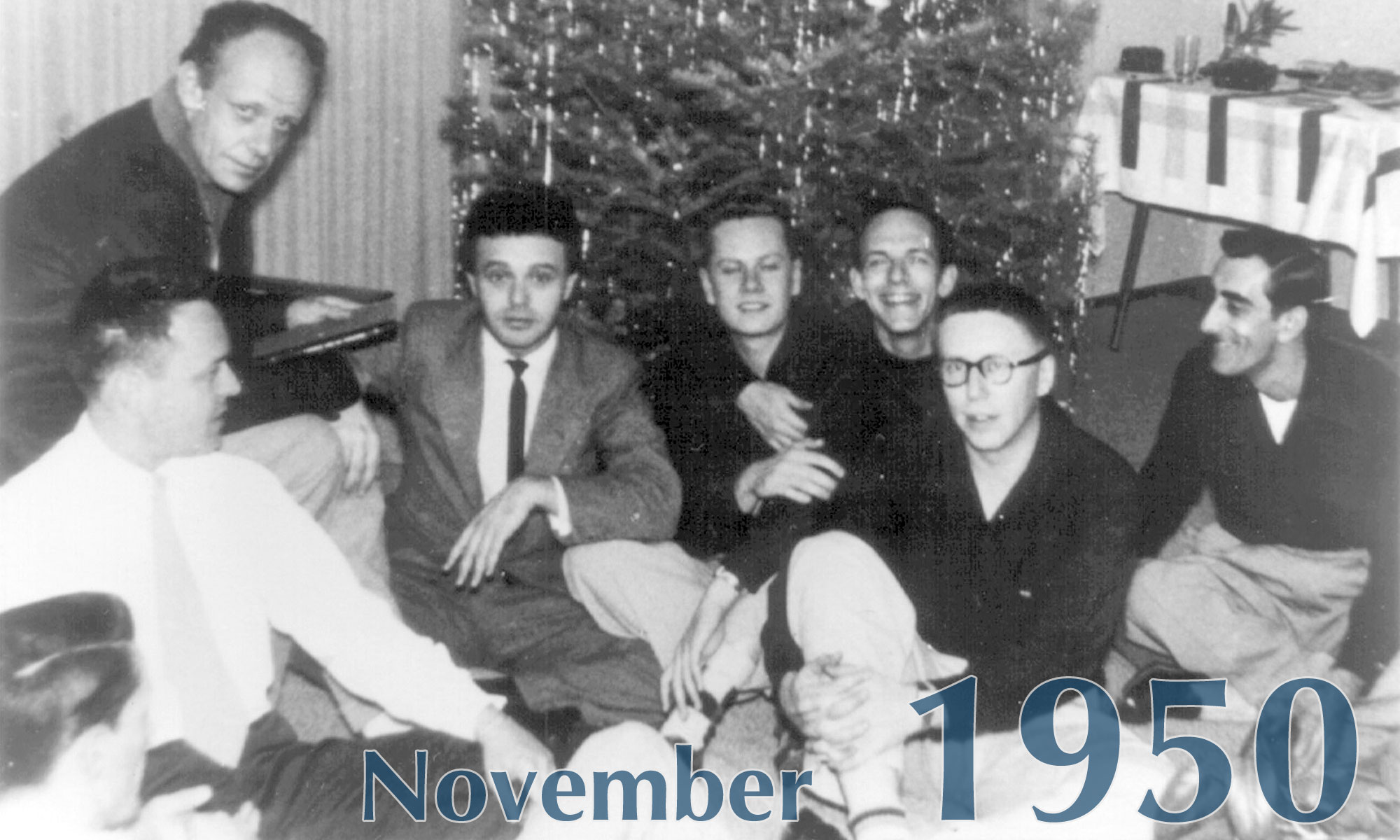| ◄ NOVEMBER ► | ||||||
|---|---|---|---|---|---|---|
| ◄ 1950 ► | ||||||
| 1 | 2 | 3 | 4 | |||
| 5 | 6 | 7 | 8 | 9 | 10 | 11 |
| 12 | 13 | 14 | 15 | 16 | 17 | 18 |
| 19 | 20 | 21 | 22 | 23 | 24 | 25 |
| 26 | 27 | 28 | 29 | 30 | ||
| President: | Harry S Truman (D) | |||
| Vice-President: | Alben W. Barkley (D) | |||
| House: | 260 (D) | 166 (R) | 2 (Other) | 7 (Vacant) |
| Southern states: | 101 (D) | 2 (R) | 2 (Vacant) | |
| Senate: | 54 (D) | 42 (R) | ||
| Southern states: | 22 (D) | |||
| GDP growth: | 10.6% | (Annual) | ||
| 1.4% | (Quarterly) | |||
| Inflation: | 3.8% | |||
| Unemployment: | 4.2% | |||
| US killed in action, | 3,627 | (This month) | ||
| Korean conflict: | 12,311 | (Since Jun 28, 1950) | ||
▲Wednesday, November 1
![]()
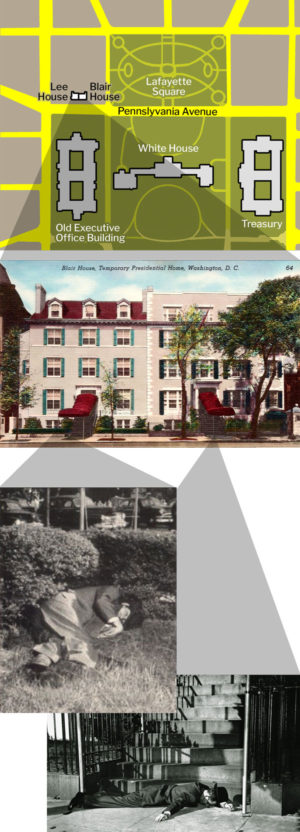 Nov 1: Utuado Uprising: Two Puerto Rican Nationalists try to assassinate President Truman. Two Puerto Rican Nationalists living in New York, Griselio Torresola and Oscar Collazo, are paying close attention to events in Puerto Rico over the past several days. Torresola’s brother and sister are among those who participated in the uprising at Jayuya two days earlier. Torresola is angered to learn that Jayuya is largely destroyed, a fact that hasn’t penetrated the virtual news blackout about the uprising in U.S. newspapers. The pair decide that they need to act quickly to bring the cause of Puerto Rican independence to world attention. The day before, they caught a train to Washington, D.C., and at 12:15 p.m. this afternoon, they approach Blair House, where President Truman is staying while the White House is being rebuilt. Torresola approaches Blair House from the west side while Collazo engages Secret Service and police from the east. Torresola shoots White House police officer Leslie Coffelt, who is inside a guard booth at the southeast corner of Lee House, which adjoins Blair House. Torresola shoots three more officers and races to the Lee House entrance when Coffelt shoots Torresola. The bullet explodes Torresola’s skull, killing him instantly and launching his body over the hedge in front of Lee House. (Coffelt dies of his injuries three hours later.) Collazo, who isn’t experienced with guns, struggles during the gunfight. He injures one officer before he is shot in the chest and is severely wounded at the steps of Blair House. The injured Collazo is still laying there as photographers snap pictures. Collazo will recover from his wounds, be tried for the assassination attempt, and sentenced to death. Truman will commute his sentence to life imprisonment in 1952. President Jimmy Carter will commute Collazo’s sentence to time served in 1979.
Nov 1: Utuado Uprising: Two Puerto Rican Nationalists try to assassinate President Truman. Two Puerto Rican Nationalists living in New York, Griselio Torresola and Oscar Collazo, are paying close attention to events in Puerto Rico over the past several days. Torresola’s brother and sister are among those who participated in the uprising at Jayuya two days earlier. Torresola is angered to learn that Jayuya is largely destroyed, a fact that hasn’t penetrated the virtual news blackout about the uprising in U.S. newspapers. The pair decide that they need to act quickly to bring the cause of Puerto Rican independence to world attention. The day before, they caught a train to Washington, D.C., and at 12:15 p.m. this afternoon, they approach Blair House, where President Truman is staying while the White House is being rebuilt. Torresola approaches Blair House from the west side while Collazo engages Secret Service and police from the east. Torresola shoots White House police officer Leslie Coffelt, who is inside a guard booth at the southeast corner of Lee House, which adjoins Blair House. Torresola shoots three more officers and races to the Lee House entrance when Coffelt shoots Torresola. The bullet explodes Torresola’s skull, killing him instantly and launching his body over the hedge in front of Lee House. (Coffelt dies of his injuries three hours later.) Collazo, who isn’t experienced with guns, struggles during the gunfight. He injures one officer before he is shot in the chest and is severely wounded at the steps of Blair House. The injured Collazo is still laying there as photographers snap pictures. Collazo will recover from his wounds, be tried for the assassination attempt, and sentenced to death. Truman will commute his sentence to life imprisonment in 1952. President Jimmy Carter will commute Collazo’s sentence to time served in 1979.
![]()
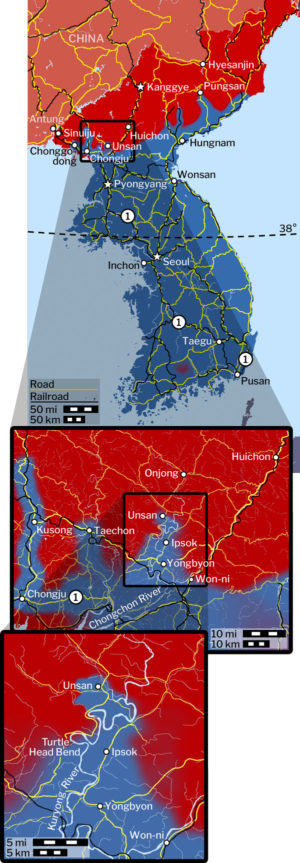 Nov 1: Korean War: American, British forces reach to within 18 miles of Chinese border. On the west coast, American and British forces advance from Chongju to Chonggo-dong, just eighteen air miles (29 km) from Sinunju and the Yalu River. With enemy resistance largely melted away and the Yalu so tantalizingly close, they are shocked to receive urgent orders from U.N. command to stop and prepare defensive positions in depth. Another force moves north from Chongju, and after overcoming heavy resistance the day before, captures Kusong. Today, advance elements are about ten miles (16 km) north of Kusong when they, too, receive an emergency order from U.N. command to stop and hold in place until it receives further orders.
Nov 1: Korean War: American, British forces reach to within 18 miles of Chinese border. On the west coast, American and British forces advance from Chongju to Chonggo-dong, just eighteen air miles (29 km) from Sinunju and the Yalu River. With enemy resistance largely melted away and the Yalu so tantalizingly close, they are shocked to receive urgent orders from U.N. command to stop and prepare defensive positions in depth. Another force moves north from Chongju, and after overcoming heavy resistance the day before, captures Kusong. Today, advance elements are about ten miles (16 km) north of Kusong when they, too, receive an emergency order from U.N. command to stop and hold in place until it receives further orders.
![]() Nov 1: Korean War, West Coast: China launches First Phase Offensive. The reason for the sudden stop-in-place orders along the west coast quickly becomes apparent when Chinese forces push the ROK 7th Division back from Onjong and Huichon all the way back to Won-ni. Other ROK forces northwest of Unsan come under withering attacks and cease to be organized fighting forces. This leaves the right flank of the three battalions of the U.S. 1st Cavalry Division and three battalions of the ROK 15th Regiment at Unsan exposed. The ROK forces are holding the line northeast and east of Unsan, and the American forces are north, west and southwest of Unsan. Together, the Americans and South Koreans are surrounded on three sides. Furthermore, the Chinese have established formidable roadblocks on the supply road to the south at Turtle Head Bend of the Kuryong River. By dusk, the U.N. forces face a new threat they have never encountered before in this war: Soviet Katushka 82-mm rockets fired from trucks. By midnight, the ROK forces east of Unsan cease to exist as a fighting force; almost all of them are killed or captured. A small American patrol at the road junction northwest of Unsan retreats back to town and prepares to evacuate to Ipsok. At the same time, three other battalions positioned north and east of Unsan come under savage Chinese attack accompanied by the sound of bugles and whistles. In some cases, the fighting disintegrates into hand-to-hand combat. A third battalion southwest of Unsan will become separated from the other two. The situation at Unsan is now so desperate that the U.N. forces along the west coast that had been ordered to stop their advance receive new orders: They are to withdraw back to the Chongchon River. U.N. command also orders what remains of the forces at Unsan to withdraw south to positions north of Yongbyong.
Nov 1: Korean War, West Coast: China launches First Phase Offensive. The reason for the sudden stop-in-place orders along the west coast quickly becomes apparent when Chinese forces push the ROK 7th Division back from Onjong and Huichon all the way back to Won-ni. Other ROK forces northwest of Unsan come under withering attacks and cease to be organized fighting forces. This leaves the right flank of the three battalions of the U.S. 1st Cavalry Division and three battalions of the ROK 15th Regiment at Unsan exposed. The ROK forces are holding the line northeast and east of Unsan, and the American forces are north, west and southwest of Unsan. Together, the Americans and South Koreans are surrounded on three sides. Furthermore, the Chinese have established formidable roadblocks on the supply road to the south at Turtle Head Bend of the Kuryong River. By dusk, the U.N. forces face a new threat they have never encountered before in this war: Soviet Katushka 82-mm rockets fired from trucks. By midnight, the ROK forces east of Unsan cease to exist as a fighting force; almost all of them are killed or captured. A small American patrol at the road junction northwest of Unsan retreats back to town and prepares to evacuate to Ipsok. At the same time, three other battalions positioned north and east of Unsan come under savage Chinese attack accompanied by the sound of bugles and whistles. In some cases, the fighting disintegrates into hand-to-hand combat. A third battalion southwest of Unsan will become separated from the other two. The situation at Unsan is now so desperate that the U.N. forces along the west coast that had been ordered to stop their advance receive new orders: They are to withdraw back to the Chongchon River. U.N. command also orders what remains of the forces at Unsan to withdraw south to positions north of Yongbyong.
![]() Nov 1: Korean War: U.S. Army spokesman admits Chinese have intervened. For the first time, a U.S. I Corps spokesman admits that “Chinese troops have launched an assault.” “We don’t know whether they represent the Chinese Government,” he said, reflecting the belief at U.N. command that the Chinese soldiers represent reinforcements that are being sent in to strengthen the North Korean army rather than Chinese Army units under Chinese command.
Nov 1: Korean War: U.S. Army spokesman admits Chinese have intervened. For the first time, a U.S. I Corps spokesman admits that “Chinese troops have launched an assault.” “We don’t know whether they represent the Chinese Government,” he said, reflecting the belief at U.N. command that the Chinese soldiers represent reinforcements that are being sent in to strengthen the North Korean army rather than Chinese Army units under Chinese command.
![]() Nov 1: Pope Pius XII defines the dogma of the Assumption of the Blessed Virgin Mary, which says that God took Mary’s body into Heaven after her death.
Nov 1: Pope Pius XII defines the dogma of the Assumption of the Blessed Virgin Mary, which says that God took Mary’s body into Heaven after her death.
![]()
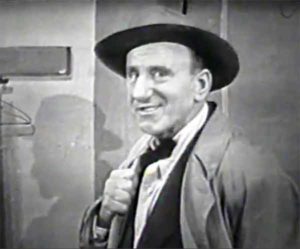 Nov 1: Jimmy Durante Show premieres on NBC. The former Vaudeville star turned comedian and singer, with the distinctive gravelly voice and Lower East Side accent, has been entertaining entertaining audiences in night clubs and radio for years. Tonight the Great Schnozzolla begins his television career with NBC’s Four Star Review, in which he hosts a comedy-variety program once a month (Ed Wynn, Danny Thomas and Jack Carson are rotating hosts for the other three weeks). The New York Times raves: “Always he was just himself — alternately clowning, singing, dancing, roughhousing and rewriting the English language. For sheer exuberance of the comic spirit, it was something not to be missed.” Durante ends his program, like he always does, with his signature sign-off: “Good night, Mrs. Calabash, wherever you are.”
Nov 1: Jimmy Durante Show premieres on NBC. The former Vaudeville star turned comedian and singer, with the distinctive gravelly voice and Lower East Side accent, has been entertaining entertaining audiences in night clubs and radio for years. Tonight the Great Schnozzolla begins his television career with NBC’s Four Star Review, in which he hosts a comedy-variety program once a month (Ed Wynn, Danny Thomas and Jack Carson are rotating hosts for the other three weeks). The New York Times raves: “Always he was just himself — alternately clowning, singing, dancing, roughhousing and rewriting the English language. For sheer exuberance of the comic spirit, it was something not to be missed.” Durante ends his program, like he always does, with his signature sign-off: “Good night, Mrs. Calabash, wherever you are.”
▲Thursday, November 2
![]()
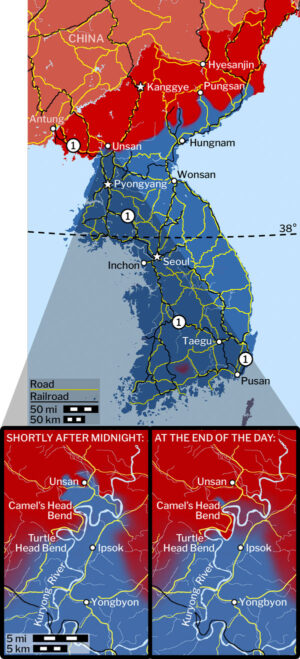 Nov 2: Korean War, West Coast: Two U.S. battalions decimated in Chinese onslaught at Unsan. The overnight attempt by American forces to withdraw from Unsan goes very badly. The 1st and 2nd Battalions of the U.S. 8th Cavalry Regiment, 1st Cavalry Division, located north and east of Unsan respectively, are in bitter combat against a relentless Chinese attack when they receive orders to withdraw. Their only way out is via secondary roads that take them to a ford across the Kuryong River about 4½ miles (7¼ km) northwest of Ipsok. About a half-hour after midnight, the 1st Battalion reaches the road junction on Unsan’s eastern edge, where they discover that the Chinese are already occupying the town and are firing on the battalion’s only escape route on the road south. The 1st and 2nd Battalions, along with a few South Korean stragglers, fight their way through and around Unsan to reach the road fork to the south. When they turn east to proceed to the ford, they are ambushed by more Chinese troops from the east that had crossed a Kuryong River tributary and set up roadblocks. By 2:30 a.m., the Chinese had cut the only remaining escape road from Unsan. What’s left of the two American battalions cease to exist as fighting forces as soldiers who are still able to do so escape into the hills. Those who make it to Ipsok are guided by the sound of artillery being fired from there to support the ROK 1st Division.
Nov 2: Korean War, West Coast: Two U.S. battalions decimated in Chinese onslaught at Unsan. The overnight attempt by American forces to withdraw from Unsan goes very badly. The 1st and 2nd Battalions of the U.S. 8th Cavalry Regiment, 1st Cavalry Division, located north and east of Unsan respectively, are in bitter combat against a relentless Chinese attack when they receive orders to withdraw. Their only way out is via secondary roads that take them to a ford across the Kuryong River about 4½ miles (7¼ km) northwest of Ipsok. About a half-hour after midnight, the 1st Battalion reaches the road junction on Unsan’s eastern edge, where they discover that the Chinese are already occupying the town and are firing on the battalion’s only escape route on the road south. The 1st and 2nd Battalions, along with a few South Korean stragglers, fight their way through and around Unsan to reach the road fork to the south. When they turn east to proceed to the ford, they are ambushed by more Chinese troops from the east that had crossed a Kuryong River tributary and set up roadblocks. By 2:30 a.m., the Chinese had cut the only remaining escape road from Unsan. What’s left of the two American battalions cease to exist as fighting forces as soldiers who are still able to do so escape into the hills. Those who make it to Ipsok are guided by the sound of artillery being fired from there to support the ROK 1st Division.
![]() Nov 2: Korean War: Third U.S. battalion stranded, no hope for rescue. While the 1st and 2nd Battalions are making their escape from north and east of Unsan, the 3rd Battalion, positioned along an arc extending northwest from Camel’s Head Bend of the Kuryong River, has enjoyed a relatively quiet evening the day before when, just before midnight, they receive orders to withdraw. They were to proceed to the road fork northeast of their position, and then move southeast on the same route that the other two battalions were to travel on. But with that escape route blocked by 2:30 a.m., commanders are consulting maps looking for another way out when they hear a bugle sounding taps. This is a signal for a large-scale surprise attack by Chinese forces against the American battalion. Pfc. Henry Tapper, of High Point, North Carolina, will tell a United Press reporter, “Bugles started playing taps, but far away. Someone blew a whistle and our area was shot to hell in a matter of minutes. I’m not too sure how it all happened right now, but I knew we lost more of our outfit there than got out.” Pfc. William O’Rama of New York City said he heard the bugles “very faint like. We were talking about it when a hand grenade was tossed into our hole.” Cpl. Louis Wagner of Mankato, Minnesota, said he was awakened by exploding grenades. “The lieutenant tried to get us organized, but those Chinese had every man spotted and they killed every man they wanted to.” Says Lt. Patrick J. MacDonnel of Vancouver, Washington, “There was no such a thing as fighting back. The chances were greatest that you would hit one of your own men rather than the enemy.” Says Lt. W.C. Hill of Springfield, Illinois, “I thought I was dreaming when I heard a bugle sounding taps and the beat of horses’ hooves in the distance. Then, as though they came out of a burst of smoke, shadowy figures started shooting and bayonetting everybody they could find.” Fighting continues until daybreak, much of it hand-to-hand and close-quarters combat. At dawn, U.N. fighter-bomber aircraft arrive and begin a daylong series of strikes against the Chinese. This forces the enemy under cover and gives what’s left of the 3rd Battalion a chance to try to gather the wounded and take stock of the situation. Meanwhile the 5th Regiment of the 1st Cavalry Division moves northward to rescue the 3rd Battalion. They try to dislodge the Chinese from their heavily-fortified positions at Turtle Head Bend, but they make no headway in the daylong battle and by nightfall are ordered to withdraw. With that defeat, the 3rd Battalion has no further hope of rescue.
Nov 2: Korean War: Third U.S. battalion stranded, no hope for rescue. While the 1st and 2nd Battalions are making their escape from north and east of Unsan, the 3rd Battalion, positioned along an arc extending northwest from Camel’s Head Bend of the Kuryong River, has enjoyed a relatively quiet evening the day before when, just before midnight, they receive orders to withdraw. They were to proceed to the road fork northeast of their position, and then move southeast on the same route that the other two battalions were to travel on. But with that escape route blocked by 2:30 a.m., commanders are consulting maps looking for another way out when they hear a bugle sounding taps. This is a signal for a large-scale surprise attack by Chinese forces against the American battalion. Pfc. Henry Tapper, of High Point, North Carolina, will tell a United Press reporter, “Bugles started playing taps, but far away. Someone blew a whistle and our area was shot to hell in a matter of minutes. I’m not too sure how it all happened right now, but I knew we lost more of our outfit there than got out.” Pfc. William O’Rama of New York City said he heard the bugles “very faint like. We were talking about it when a hand grenade was tossed into our hole.” Cpl. Louis Wagner of Mankato, Minnesota, said he was awakened by exploding grenades. “The lieutenant tried to get us organized, but those Chinese had every man spotted and they killed every man they wanted to.” Says Lt. Patrick J. MacDonnel of Vancouver, Washington, “There was no such a thing as fighting back. The chances were greatest that you would hit one of your own men rather than the enemy.” Says Lt. W.C. Hill of Springfield, Illinois, “I thought I was dreaming when I heard a bugle sounding taps and the beat of horses’ hooves in the distance. Then, as though they came out of a burst of smoke, shadowy figures started shooting and bayonetting everybody they could find.” Fighting continues until daybreak, much of it hand-to-hand and close-quarters combat. At dawn, U.N. fighter-bomber aircraft arrive and begin a daylong series of strikes against the Chinese. This forces the enemy under cover and gives what’s left of the 3rd Battalion a chance to try to gather the wounded and take stock of the situation. Meanwhile the 5th Regiment of the 1st Cavalry Division moves northward to rescue the 3rd Battalion. They try to dislodge the Chinese from their heavily-fortified positions at Turtle Head Bend, but they make no headway in the daylong battle and by nightfall are ordered to withdraw. With that defeat, the 3rd Battalion has no further hope of rescue.
![]()
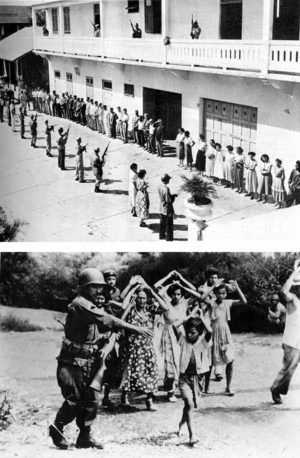 Nov 2: Utuado Uprising: Puerto Rican Nationalist leader arrested. The Puerto Rican Nationalist rebellion is defeated throughout the territory, but Nationalist Party leader Pedro Albizu Campos is still barricaded at his home and party headquarters in San Juan, where he has been surrounded by National Guardsmen and police since October 27. Today, police get lucky when they launch a tear gas grenade into his home, causing him to pass out. A friend in the building surrenders to police, bringing the last of the fighting to an end. Puerto Rico’s Insular Police announce that they have arrested more than 450 people so far. The names listed include not only Nationalists and Communists (who did not participate in the uprising) but also relatives of Nationalists, union leaders and other political opponents of Gov. Luís Muñoz Marín. In the ensuing week, more than three thousand men, women and children will be rounded up by the Insular Police.
Nov 2: Utuado Uprising: Puerto Rican Nationalist leader arrested. The Puerto Rican Nationalist rebellion is defeated throughout the territory, but Nationalist Party leader Pedro Albizu Campos is still barricaded at his home and party headquarters in San Juan, where he has been surrounded by National Guardsmen and police since October 27. Today, police get lucky when they launch a tear gas grenade into his home, causing him to pass out. A friend in the building surrenders to police, bringing the last of the fighting to an end. Puerto Rico’s Insular Police announce that they have arrested more than 450 people so far. The names listed include not only Nationalists and Communists (who did not participate in the uprising) but also relatives of Nationalists, union leaders and other political opponents of Gov. Luís Muñoz Marín. In the ensuing week, more than three thousand men, women and children will be rounded up by the Insular Police.
![]() Nov 2: Irish playwright and Nobel Prize winner George Bernard Shaw dies at the age 94.
Nov 2: Irish playwright and Nobel Prize winner George Bernard Shaw dies at the age 94.
▲Friday, November 3
![]()
 Nov 3: Korean War, Northeast: Chinese attack U.S. Marines north of Hungnam. Shortly after midnight in the area south of the Chosin (Changjin) Reservoir, the Chinese launch a strong attack against U.S. Marines about a mile (1.6 km) south of Sudong. The Marines had just replaced ROK units the day before after the South Koreans had been pushed back from Funchilin Pass. The Chinese almost overrun Marine forward positions in close quarter combat. When daylight arrives, Marine aircraft join the action. After a heavy all-day battle, the Chinese inexplicably breaks off contact and withdraws. The next day, U.S. Marines will pass through Sudong and Chinhung-ni against light resistance. This will bring the Marines to the foot of the narrow, steep and treacherous Funchilin Pass.
Nov 3: Korean War, Northeast: Chinese attack U.S. Marines north of Hungnam. Shortly after midnight in the area south of the Chosin (Changjin) Reservoir, the Chinese launch a strong attack against U.S. Marines about a mile (1.6 km) south of Sudong. The Marines had just replaced ROK units the day before after the South Koreans had been pushed back from Funchilin Pass. The Chinese almost overrun Marine forward positions in close quarter combat. When daylight arrives, Marine aircraft join the action. After a heavy all-day battle, the Chinese inexplicably breaks off contact and withdraws. The next day, U.S. Marines will pass through Sudong and Chinhung-ni against light resistance. This will bring the Marines to the foot of the narrow, steep and treacherous Funchilin Pass.
![]() Nov 3: Korean War, West Coast: U.N. forces consolidate the Chongchon River line. U.N. forces along the west coast retreat southward to the Chongchon River and take up new defensive positions to protect its north bank. The 27th British Commonwealth Bigade moves from Taechon to its assigned positions around Pakchon to hold the bridgehead’s northwest corner. Chinese forces enter Taechon less than an hour after the last of the British forces leave. The 19th Infantry Regiment of the U.S. 24th Division takes up new positions north of the Chongchon and northeast of Anju. The next day the ROK 1st Division, which is still battling Chinese forces north of Yongbyon will retreat across the Chongyong to shorten up the lines from Pakchon to Won-ni.
Nov 3: Korean War, West Coast: U.N. forces consolidate the Chongchon River line. U.N. forces along the west coast retreat southward to the Chongchon River and take up new defensive positions to protect its north bank. The 27th British Commonwealth Bigade moves from Taechon to its assigned positions around Pakchon to hold the bridgehead’s northwest corner. Chinese forces enter Taechon less than an hour after the last of the British forces leave. The 19th Infantry Regiment of the U.S. 24th Division takes up new positions north of the Chongchon and northeast of Anju. The next day the ROK 1st Division, which is still battling Chinese forces north of Yongbyon will retreat across the Chongyong to shorten up the lines from Pakchon to Won-ni.
![]() Nov 3: Korean War: Press reports suggest Chinese intervention is greater than U.N. admits. Lindesay Parrott of the New York Times reports that U.N. Command has become much more tightlipped over the past few days and refuses to comment about the Chinese forces they’re encountering. But off the record, other sources tell Parrott that “the entire Forty-second Corps of Mao Tse-tung’s (Mao Zedong) Eighth Route Army has crossed the Korean border. Corps strength, it was calculated, scarcely could be less than 20,000, and there appeared little question that United States and Chinese Communist troops were now in contact” Another Times reporter, Michael James, writes from Hamhung that American and Korean advisers “in a position to know” say that one entire regiment encountered by the ROK I Corps is all-Chinese, identified as the 370th regiment, 124 Division, 42nd Corps of the Chinese Eighth Route Army. The South Koreans at Hamhung are more forthcoming: “They feel certain that the whole corps has been assigned to duty in northern Korea.” Meanwhile, Peiping (Beijing) radio says that in rallies throughout Manchuria, “people are declaring that action must be taken to assist (North) Korea and protect our country at home.”
Nov 3: Korean War: Press reports suggest Chinese intervention is greater than U.N. admits. Lindesay Parrott of the New York Times reports that U.N. Command has become much more tightlipped over the past few days and refuses to comment about the Chinese forces they’re encountering. But off the record, other sources tell Parrott that “the entire Forty-second Corps of Mao Tse-tung’s (Mao Zedong) Eighth Route Army has crossed the Korean border. Corps strength, it was calculated, scarcely could be less than 20,000, and there appeared little question that United States and Chinese Communist troops were now in contact” Another Times reporter, Michael James, writes from Hamhung that American and Korean advisers “in a position to know” say that one entire regiment encountered by the ROK I Corps is all-Chinese, identified as the 370th regiment, 124 Division, 42nd Corps of the Chinese Eighth Route Army. The South Koreans at Hamhung are more forthcoming: “They feel certain that the whole corps has been assigned to duty in northern Korea.” Meanwhile, Peiping (Beijing) radio says that in rallies throughout Manchuria, “people are declaring that action must be taken to assist (North) Korea and protect our country at home.”
![]() Nov 3: Truman Assassination Attempt: Widow of would-be assassin arrested. Carmen Dolores Otero de Torresola is arrested in New York City and arraigned on charges of conspiracy in connection with the plot to kill President Harry Truman by her late husband, Griselio Torresola, and Torresola’s friend Oscar Collazo. Also arrested is Oscar Collazo’s wife, Rosa Collazo, who will be arraigned on Thursday. Oscar Collazo is still in the hospital recovering from his wounds suffered during the failed assassination attempt at Blair House on Wednesday. Both women will be held for nine months in federal detention, although neither will be brought to trial.
Nov 3: Truman Assassination Attempt: Widow of would-be assassin arrested. Carmen Dolores Otero de Torresola is arrested in New York City and arraigned on charges of conspiracy in connection with the plot to kill President Harry Truman by her late husband, Griselio Torresola, and Torresola’s friend Oscar Collazo. Also arrested is Oscar Collazo’s wife, Rosa Collazo, who will be arraigned on Thursday. Oscar Collazo is still in the hospital recovering from his wounds suffered during the failed assassination attempt at Blair House on Wednesday. Both women will be held for nine months in federal detention, although neither will be brought to trial.
![]()
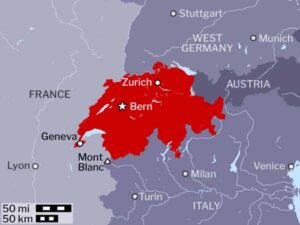 Nov 3: Air India flight crashes in to the Alps. An Air India flight, carrying forty passengers and eight crew on a Bombay-Istanbul-Geneva-London route, crashes into the French Alps while descending toward Geneva Airport. Capt Alan Saint, who is piloting the Lockheed L-749A Constellation, radioed Geneva at 10:43 a.m. to say that he was over Grenoble, France, sixty-five miles (100 km) south of Geneva, and he expected to land at Geneva airport at 11:05. The plane crashes on the French side of Mont Blanc, killing all forty-eight on board. Stormy weather prevents searchers from finding the wreckage until two days later. They discover that if the plane had been just 30 meters (100 feet) to the west, it would have missed the peak. A cause for the crash is never identified. The forty passengers are East Indian seamen hired to work a newly-launched vessel in England.
Nov 3: Air India flight crashes in to the Alps. An Air India flight, carrying forty passengers and eight crew on a Bombay-Istanbul-Geneva-London route, crashes into the French Alps while descending toward Geneva Airport. Capt Alan Saint, who is piloting the Lockheed L-749A Constellation, radioed Geneva at 10:43 a.m. to say that he was over Grenoble, France, sixty-five miles (100 km) south of Geneva, and he expected to land at Geneva airport at 11:05. The plane crashes on the French side of Mont Blanc, killing all forty-eight on board. Stormy weather prevents searchers from finding the wreckage until two days later. They discover that if the plane had been just 30 meters (100 feet) to the west, it would have missed the peak. A cause for the crash is never identified. The forty passengers are East Indian seamen hired to work a newly-launched vessel in England.
▲Saturday, November 4
![]()
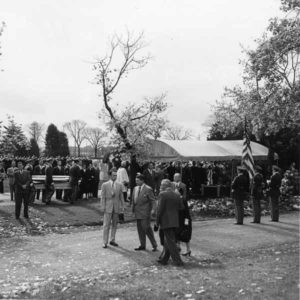 Nov 4: President Truman attends funeral of slain White House guard. Surrounded by an unusually heavy security detail, President and Mrs. Truman pay their respects at the funeral for Pvt. Leslie Coffelt, who was killed in Tuesday’s assassination attempt against Truman by Puerto Rican Nationalists. Coffelt was already mortally wounded when he shot and killed one of the would-be assassins. Coffelt is buried with full military honors at Arlington National Cemetery.
Nov 4: President Truman attends funeral of slain White House guard. Surrounded by an unusually heavy security detail, President and Mrs. Truman pay their respects at the funeral for Pvt. Leslie Coffelt, who was killed in Tuesday’s assassination attempt against Truman by Puerto Rican Nationalists. Coffelt was already mortally wounded when he shot and killed one of the would-be assassins. Coffelt is buried with full military honors at Arlington National Cemetery.
![]() Nov 4: Korean War: U.S., Britain weigh accusing Peiping of joining Korean War. U.S. spokesmen at Lake Success, New York, temporary home of the United Nations Security Council, say that the U.S. is considering the possibility of accusing Communist China of participating in the Korean War. The unidentified officials say they don’t have enough evidence yet to determine a course of action. But they say they are considering asking a U.N. commission to investigate before brining formal accusations against Peiping (Beijing). Informed sources in Britain’s Foreign Office say that the Government is discussing reports of Chinese intervention and may protest directly to Peiping. Britan is the only Western power to recognize the Communist Chinese government.
Nov 4: Korean War: U.S., Britain weigh accusing Peiping of joining Korean War. U.S. spokesmen at Lake Success, New York, temporary home of the United Nations Security Council, say that the U.S. is considering the possibility of accusing Communist China of participating in the Korean War. The unidentified officials say they don’t have enough evidence yet to determine a course of action. But they say they are considering asking a U.N. commission to investigate before brining formal accusations against Peiping (Beijing). Informed sources in Britain’s Foreign Office say that the Government is discussing reports of Chinese intervention and may protest directly to Peiping. Britan is the only Western power to recognize the Communist Chinese government.
▲Sunday, November 5
Guy Fawkes Night (UK)
![]()
 Nov 5: Korean War, Chosin Reservoir: U.S. Marines begin advance to the Chosin Reservoir. The road from Hamhung to Chinhung-ni is a fairly easy two-lane dirt road that rises slowly to the base of the Koto-ri plateau. North of Chunhung-ni it becomes a one-lane dirt road zigzaging its way up the treacherous slopes of Funchilin pass to the top of the 4,000-foot (1,220 m) plateau. The Marines move north from Chinhunh-ni but are stopped at the foot of the pass by Chinese troops occupying the heights flanking the road. The Marines seize a hill overlooking the southern entrance to the pass from the southwest. From Chinese prisoners, clad in distinctive quilted cotton winter uniforms and fur-lined caps, they learn that the Chinese 125th and 126th Divisions are in the area. After an entire day and night of pounding American artillery, the Chinese will withdraw from the heights overlooking the pass from the east the next morning.
Nov 5: Korean War, Chosin Reservoir: U.S. Marines begin advance to the Chosin Reservoir. The road from Hamhung to Chinhung-ni is a fairly easy two-lane dirt road that rises slowly to the base of the Koto-ri plateau. North of Chunhung-ni it becomes a one-lane dirt road zigzaging its way up the treacherous slopes of Funchilin pass to the top of the 4,000-foot (1,220 m) plateau. The Marines move north from Chinhunh-ni but are stopped at the foot of the pass by Chinese troops occupying the heights flanking the road. The Marines seize a hill overlooking the southern entrance to the pass from the southwest. From Chinese prisoners, clad in distinctive quilted cotton winter uniforms and fur-lined caps, they learn that the Chinese 125th and 126th Divisions are in the area. After an entire day and night of pounding American artillery, the Chinese will withdraw from the heights overlooking the pass from the east the next morning.
![]() Nov 5: Korean War, Northeast: South Koreans take Kilchu. On the northeastern coastal road, the North Koreans have retreated to Kilchu, which actually sits about fourteen air miles (22½ km) from the coast itself, which places it beyond the reach of naval gunfire. The South Koreans attacked the town two days earlier, and it falls by noon today. At Pukchong, American forces had been fighting pitched battles against a determined enemy right up until the day before, when the Americans suddenly discover that the town was abandoned overnight. Today they have advanced unopposed to the Ungi River, which is forty (65 km) air miles from Pukchong, but more than sixty miles (95 km) by twisty, narrow mountain roads. By the time they get to the Ungi River, the temperatures have plunged to -2°F (-19°C).
Nov 5: Korean War, Northeast: South Koreans take Kilchu. On the northeastern coastal road, the North Koreans have retreated to Kilchu, which actually sits about fourteen air miles (22½ km) from the coast itself, which places it beyond the reach of naval gunfire. The South Koreans attacked the town two days earlier, and it falls by noon today. At Pukchong, American forces had been fighting pitched battles against a determined enemy right up until the day before, when the Americans suddenly discover that the town was abandoned overnight. Today they have advanced unopposed to the Ungi River, which is forty (65 km) air miles from Pukchong, but more than sixty miles (95 km) by twisty, narrow mountain roads. By the time they get to the Ungi River, the temperatures have plunged to -2°F (-19°C).
![]() Nov 5: Korean War: Chinese attack imperils Chongchon River crossing at Anju. A large Chinese force, with troops clearly dressed in Chinese field dress uniforms, infiltrate through a large mountain mass between Pakchon and Chonghyon, with some reaching as far south as the banks of the Chongchon River and threatening the only bridge still spanning the river northwest of Anju. During the attack, the Chinese very nearly succeed in surrounding and cutting off British and Australian forces in Pakchon. The British and Australians are able to successfully withdraw south to the north banks of the Chongchon River before the Chinese launch their massive night assault. After very hard fighting overnight, the Chinese break off contact the following morning. At Yongbyong, a few survivors of the U.S. 7th Cavalry have made their way back to U.N. lines. They return in groups of two or three, bringing with them harrowing accounts of hand-to-hand combat and their desperate treks to safety. Chinese forces also continue heavy attacks in the Won-ni and Kunu-ri areas, but the South Koreans are able to more or less maintain most of their positions. Unnamed observers at I Corps say that elements of three Chinese division have fought around Unsan, Pakchon, and the Chongchon River, and there are indications that two other Chinese units of indeterminate size are in reserve. The Associated Press estimates that there are as many as 75,000 Chinese troops fighting in the region.
Nov 5: Korean War: Chinese attack imperils Chongchon River crossing at Anju. A large Chinese force, with troops clearly dressed in Chinese field dress uniforms, infiltrate through a large mountain mass between Pakchon and Chonghyon, with some reaching as far south as the banks of the Chongchon River and threatening the only bridge still spanning the river northwest of Anju. During the attack, the Chinese very nearly succeed in surrounding and cutting off British and Australian forces in Pakchon. The British and Australians are able to successfully withdraw south to the north banks of the Chongchon River before the Chinese launch their massive night assault. After very hard fighting overnight, the Chinese break off contact the following morning. At Yongbyong, a few survivors of the U.S. 7th Cavalry have made their way back to U.N. lines. They return in groups of two or three, bringing with them harrowing accounts of hand-to-hand combat and their desperate treks to safety. Chinese forces also continue heavy attacks in the Won-ni and Kunu-ri areas, but the South Koreans are able to more or less maintain most of their positions. Unnamed observers at I Corps say that elements of three Chinese division have fought around Unsan, Pakchon, and the Chongchon River, and there are indications that two other Chinese units of indeterminate size are in reserve. The Associated Press estimates that there are as many as 75,000 Chinese troops fighting in the region.
▲Monday, November 6
![]() Nov 6: Korean War: MacArthur acknowledges Communist China’s intervention in Korea. Gen. Douglas MacArthur, Supreme Commander of the U.N. forces in Korea, issues a communiqué acknowledging Communist China’s intervention in the Korean War. He charges China with committing “one of the most offensive acts of international lawlessness of historic record by moving without any notice of belligerency elements of alien Communist forces across the Yalu River into North Korea.” He says that before China acted, “the defeat of the North Koreans and destruction of their armies was thereby decisive.” MacArthur accuses China of “massing a great concentration of possible reinforcing divisions with adequate supply behind the privileged sanctuary of the adjacent Manchurian border. … The present situation, therefore, is this: While the North Korean forces with which we were initially engaged have been destroyed or rendered impotent for military action, a new and fresh army now faces us, backed up by a possibility of large alien reserves and adequate supply within easy reach to the enemy but beyond the limits of our present sphere of military action. Whether and to what extent these reserves will be moved forward to reinforce units now committed remains to be seen and is a matter of the gravest international significance.” In Tokyo, unnamed officials estimate that China has 300,000 seasoned veterans of the Chinese civil war available immediately inside North Korea or just across the Yalu River in Manchuria, and that there are another 300,000 troops that can be made available quickly. This gives the Chinese the potential of vastly outnumbering the present United Nations forces in Korea. The optimistic talk two weeks ago of an early end of the war has evaporated. Says Assistant Secretary of Defense Paul Griffith, “It will be impossible to plan to bring the boys back before Christmas.”
Nov 6: Korean War: MacArthur acknowledges Communist China’s intervention in Korea. Gen. Douglas MacArthur, Supreme Commander of the U.N. forces in Korea, issues a communiqué acknowledging Communist China’s intervention in the Korean War. He charges China with committing “one of the most offensive acts of international lawlessness of historic record by moving without any notice of belligerency elements of alien Communist forces across the Yalu River into North Korea.” He says that before China acted, “the defeat of the North Koreans and destruction of their armies was thereby decisive.” MacArthur accuses China of “massing a great concentration of possible reinforcing divisions with adequate supply behind the privileged sanctuary of the adjacent Manchurian border. … The present situation, therefore, is this: While the North Korean forces with which we were initially engaged have been destroyed or rendered impotent for military action, a new and fresh army now faces us, backed up by a possibility of large alien reserves and adequate supply within easy reach to the enemy but beyond the limits of our present sphere of military action. Whether and to what extent these reserves will be moved forward to reinforce units now committed remains to be seen and is a matter of the gravest international significance.” In Tokyo, unnamed officials estimate that China has 300,000 seasoned veterans of the Chinese civil war available immediately inside North Korea or just across the Yalu River in Manchuria, and that there are another 300,000 troops that can be made available quickly. This gives the Chinese the potential of vastly outnumbering the present United Nations forces in Korea. The optimistic talk two weeks ago of an early end of the war has evaporated. Says Assistant Secretary of Defense Paul Griffith, “It will be impossible to plan to bring the boys back before Christmas.”
![]() Nov 6: Korean War: Chinese troops break off contact with U.N. forces. Just as Communist Chinese attacks have reached a crescendo, especially on Korea’s western coast, Chinese troops break off contact and withdraw away from the front lines. This signals the end of what will later be known as the Chinese First Phase Offensive. This offensive, as far as the Chinese are concerned, is a test run, to gauge U.N. forces’ strengths and weaknesses. They will use what they learned in these battles to better plan for the larger Second Phase Offensive later this month. But their abrupt withdrawal confuses U.N. Command and the Pentagon. They are unable to determine exactly how big the Chinese intervention is or what its goals are. To them, this doesn’t look like an all-out commitment to battle in Korea. Maybe all they really want to do is protect the hydroelectric power plants on the Yalu River. Maybe they withdrew because their supply lines are extended. Maybe their losses were so great they now have second thoughts. As China’s lull continues over the next three weeks, MacArthur will become increasingly confident that China will not intervene any further.
Nov 6: Korean War: Chinese troops break off contact with U.N. forces. Just as Communist Chinese attacks have reached a crescendo, especially on Korea’s western coast, Chinese troops break off contact and withdraw away from the front lines. This signals the end of what will later be known as the Chinese First Phase Offensive. This offensive, as far as the Chinese are concerned, is a test run, to gauge U.N. forces’ strengths and weaknesses. They will use what they learned in these battles to better plan for the larger Second Phase Offensive later this month. But their abrupt withdrawal confuses U.N. Command and the Pentagon. They are unable to determine exactly how big the Chinese intervention is or what its goals are. To them, this doesn’t look like an all-out commitment to battle in Korea. Maybe all they really want to do is protect the hydroelectric power plants on the Yalu River. Maybe they withdrew because their supply lines are extended. Maybe their losses were so great they now have second thoughts. As China’s lull continues over the next three weeks, MacArthur will become increasingly confident that China will not intervene any further.
▲Tuesday, November 7
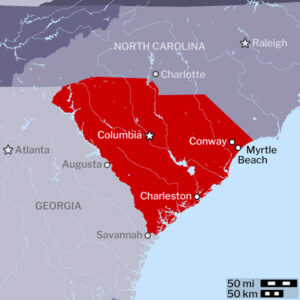 Nov 7: Bed-ridden farmer, two sons beaten by KKK near Conway, South Carolina. Rufus Lee, a bed-ridden Horry County farmer, and his two sons are dragged from their home and whipped in the early morning hours by robed and masked Ku Klux Klansmen. A dozen or so klansmen break into the home at about 1:00 a.m. The two sons, Hinson, 18, and Coolidge, 23, get up to investigate and are taken out of the house. They are made to run about a quarter of a mile up the road in their underwear under the threat of a lash. A second group goes into the home and takes Rufus, who had been released from the hospital the day before. He’s taken about a mile from home, where they whip him with a bullwhip, cut the shape of the cross into his hair, and threaten him and his family if he calls the sheriff. His crime: “You drink too much.” Sheriff C.E. Sasser says that Lee is a good provider and runs a good farm, and believes that the Klan was aroused because the Lee men had denounced the Klan to friends and neighbors. Hinson is a high school student, and Coolidge, a veteran, lives at the home with his wife and two children, with a third on the way. The Conway area has seen stepped-up Klan activity since last August, when the body of an off-duty Conway policeman was found wearing his uniform underneath Klan robes following a shoot-out at a popular Myrtle Beach nightclub. The Association of Carolina Klans are set to hold a large rally at Conway on Saturday to give “the Klan side of the recent Myrtle Beach affair.” Thomas Lee Hamilton, Carolina Klans Grand Dragon, says that the Klan had nothing to do with the Lee beatings. “I don’t stand for this kind of stuff,” says Hamilton, and blames the incident on “the law enforcement group in Horry County who are trying to shield themselves.”
Nov 7: Bed-ridden farmer, two sons beaten by KKK near Conway, South Carolina. Rufus Lee, a bed-ridden Horry County farmer, and his two sons are dragged from their home and whipped in the early morning hours by robed and masked Ku Klux Klansmen. A dozen or so klansmen break into the home at about 1:00 a.m. The two sons, Hinson, 18, and Coolidge, 23, get up to investigate and are taken out of the house. They are made to run about a quarter of a mile up the road in their underwear under the threat of a lash. A second group goes into the home and takes Rufus, who had been released from the hospital the day before. He’s taken about a mile from home, where they whip him with a bullwhip, cut the shape of the cross into his hair, and threaten him and his family if he calls the sheriff. His crime: “You drink too much.” Sheriff C.E. Sasser says that Lee is a good provider and runs a good farm, and believes that the Klan was aroused because the Lee men had denounced the Klan to friends and neighbors. Hinson is a high school student, and Coolidge, a veteran, lives at the home with his wife and two children, with a third on the way. The Conway area has seen stepped-up Klan activity since last August, when the body of an off-duty Conway policeman was found wearing his uniform underneath Klan robes following a shoot-out at a popular Myrtle Beach nightclub. The Association of Carolina Klans are set to hold a large rally at Conway on Saturday to give “the Klan side of the recent Myrtle Beach affair.” Thomas Lee Hamilton, Carolina Klans Grand Dragon, says that the Klan had nothing to do with the Lee beatings. “I don’t stand for this kind of stuff,” says Hamilton, and blames the incident on “the law enforcement group in Horry County who are trying to shield themselves.”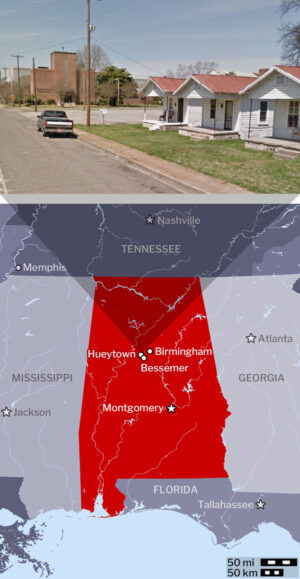 Nov 7: KKK holds large demonstrations near Birmingham. About one hundred cars filled with white-robed but unmasked klansmen parade through several black communities southwest of Birmingham, Alabama. The parade starts at about 8:00 p.m. at Bessemer and winds its way through several outlying African-American districts. The parade stops to burn a cross at the J.W. Pierce service station in the tiny hamlet of Powderly, about halfway between Bessemer and Birmingham. The parade then moves out to Hueytown, where it stops for a cross-burning in front of the St. Francis Mission, a church and school for Negroes in the African-American part of town. The parade finishes up at about 11:00 p.m. at the home of A.W. Griffiths. Most of the klansmen get out of their car and gather around another wooden cross in the front yard as it is being lit. A group goes to the door and knocks. A leader shouts, “You better straighten up! Next time we won’t knock.” Griffiths later tells a reporter he has no idea why they came to his house. His wife, her sister and his young daughter are home at the time. Mrs. Griffith says, “We were asleep and we heard a noise and saw some flames. We didn’t know what it was.” Mr. Griffith says if they come around again, he’ll greet them with gunfire. All of the klansmen are unmasked in compliance with an anti-klan state law enacted last year following a wave of floggings. This is the first mass demonstration in this are since klansmen Byrd Carradine was convicted last month in Hueytown of flogging two men and one woman in 1949 while masked.
Nov 7: KKK holds large demonstrations near Birmingham. About one hundred cars filled with white-robed but unmasked klansmen parade through several black communities southwest of Birmingham, Alabama. The parade starts at about 8:00 p.m. at Bessemer and winds its way through several outlying African-American districts. The parade stops to burn a cross at the J.W. Pierce service station in the tiny hamlet of Powderly, about halfway between Bessemer and Birmingham. The parade then moves out to Hueytown, where it stops for a cross-burning in front of the St. Francis Mission, a church and school for Negroes in the African-American part of town. The parade finishes up at about 11:00 p.m. at the home of A.W. Griffiths. Most of the klansmen get out of their car and gather around another wooden cross in the front yard as it is being lit. A group goes to the door and knocks. A leader shouts, “You better straighten up! Next time we won’t knock.” Griffiths later tells a reporter he has no idea why they came to his house. His wife, her sister and his young daughter are home at the time. Mrs. Griffith says, “We were asleep and we heard a noise and saw some flames. We didn’t know what it was.” Mr. Griffith says if they come around again, he’ll greet them with gunfire. All of the klansmen are unmasked in compliance with an anti-klan state law enacted last year following a wave of floggings. This is the first mass demonstration in this are since klansmen Byrd Carradine was convicted last month in Hueytown of flogging two men and one woman in 1949 while masked.![]() Nov 7: Democrats retain hold in Congress in midterm elections. Democrats retain their congressional majorities in the midterm elections despite losing twenty-eight seats in the House and five in the Senate. Their lead in the House is down to thirty-six seats. With twenty-two of them held by conservative Southern Democrats, this result effectively kills any glimmer of hope President Truman may still have for his Fair Deal and civil rights programs. Texas loses its only Republican member of Congress when Pampas city attorney Walter Rogers defeats Rep. Ben Guill in the race to represent the northern panhandle.
Nov 7: Democrats retain hold in Congress in midterm elections. Democrats retain their congressional majorities in the midterm elections despite losing twenty-eight seats in the House and five in the Senate. Their lead in the House is down to thirty-six seats. With twenty-two of them held by conservative Southern Democrats, this result effectively kills any glimmer of hope President Truman may still have for his Fair Deal and civil rights programs. Texas loses its only Republican member of Congress when Pampas city attorney Walter Rogers defeats Rep. Ben Guill in the race to represent the northern panhandle.
![]() Nov 7: Democrats cling to one-seat majority in the Senate. Senate Majority leader Scott W. Lucas (D-IL) loses to Rep. Everett Dirksen, making Lucas the first Majority Leader since 1932 to lose his seat while his party retains the majority. Sen. Millard Tydings (D-MD), who spent the first half of this year heading a special Senate investigations subcommittee looking into charges by Sen. Joseph McCarthy (R-WI) of Communists in the State Department, loses his seat to Republican John Marshall Butler. The Tydings and Lucas losses are seen as vindications of McCarthyism, as is the victory of Rep. Richard Nixon (R-CA), who defeats Rep. Helen Gahagan Douglas (R-CA) to gain entry into the Senate. Nixon wins in one of the most vicious campaigns in California history, partly by accusing Douglas of being “pink down to her undergarments.” Douglas coined a nickname that will stick to Nixon for the rest of his political career: Tricky Dick. Supporters of Sen. Robert A. Taft (R-OH), a.k.a “Mr. Republican,” say his landslide victory for re-election over his Democratic challenger, Joseph T. Ferguson, sets him up as the frontrunner for the 1952 GOP nomination for President.
Nov 7: Democrats cling to one-seat majority in the Senate. Senate Majority leader Scott W. Lucas (D-IL) loses to Rep. Everett Dirksen, making Lucas the first Majority Leader since 1932 to lose his seat while his party retains the majority. Sen. Millard Tydings (D-MD), who spent the first half of this year heading a special Senate investigations subcommittee looking into charges by Sen. Joseph McCarthy (R-WI) of Communists in the State Department, loses his seat to Republican John Marshall Butler. The Tydings and Lucas losses are seen as vindications of McCarthyism, as is the victory of Rep. Richard Nixon (R-CA), who defeats Rep. Helen Gahagan Douglas (R-CA) to gain entry into the Senate. Nixon wins in one of the most vicious campaigns in California history, partly by accusing Douglas of being “pink down to her undergarments.” Douglas coined a nickname that will stick to Nixon for the rest of his political career: Tricky Dick. Supporters of Sen. Robert A. Taft (R-OH), a.k.a “Mr. Republican,” say his landslide victory for re-election over his Democratic challenger, Joseph T. Ferguson, sets him up as the frontrunner for the 1952 GOP nomination for President.
![]()
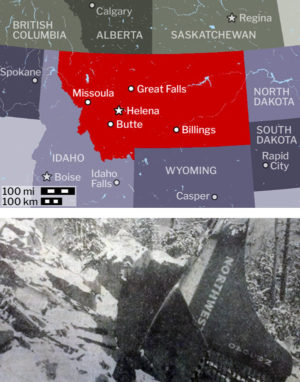 Nov 7: Northwest Airlines crashes in Butte, Montana, killing twenty-one. A Northwest Airlines flight crashes during a snowstorm while trying to land at Butte, Montana. All seventeen passengers, including two children, and four crewmembers are killed when the Martin 202 strikes a mountain at about the the 8,250-foot (2,515 m) level. The Seattle-bound flight originated in Chicago, with a stop at Minneapolis, and four stops in Montana: Billings, (where a crew change is made), Great Falls, Helena and Butte. The flight’s last communication is with the Butte tower at 8:11 a.m. as it is starting its descent. When the aircraft fails to respond to further radio calls, a search is launched. Rescuers will find the wreckage the following morning on the eastern slope of a ridge about 2½ miles (4 km) east of the airport and about 1½ miles (2½ km) off of its prescribed flight path. Instead of flying down the middle of Homestead Pass, it strikes a ridge on the north wall.
Nov 7: Northwest Airlines crashes in Butte, Montana, killing twenty-one. A Northwest Airlines flight crashes during a snowstorm while trying to land at Butte, Montana. All seventeen passengers, including two children, and four crewmembers are killed when the Martin 202 strikes a mountain at about the the 8,250-foot (2,515 m) level. The Seattle-bound flight originated in Chicago, with a stop at Minneapolis, and four stops in Montana: Billings, (where a crew change is made), Great Falls, Helena and Butte. The flight’s last communication is with the Butte tower at 8:11 a.m. as it is starting its descent. When the aircraft fails to respond to further radio calls, a search is launched. Rescuers will find the wreckage the following morning on the eastern slope of a ridge about 2½ miles (4 km) east of the airport and about 1½ miles (2½ km) off of its prescribed flight path. Instead of flying down the middle of Homestead Pass, it strikes a ridge on the north wall.
▲Wednesday, November 8
![]()
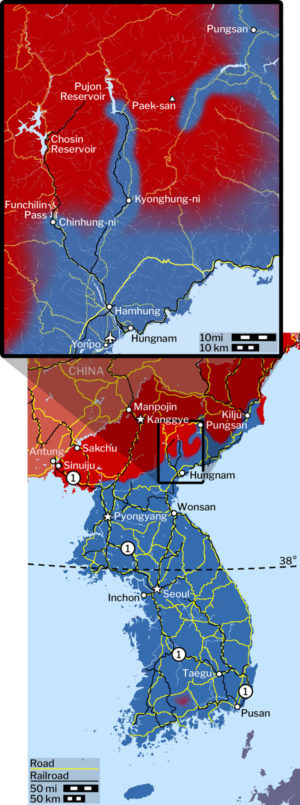 Nov 8: Korean War, Northeast: U.S. forces engage Chinese troops near Pujon Reservoir. American forces move out into the mountainous country southwest out of Pungsan with the mission of making contact with South Korean forces at the Pujon Reservoir. They encounter a large force of Chinese soldiers on the eastern slopes of Paek-san, a 7,700-foot (2350 m) peak overlooking the reservoir. After an all-day battle, the American force drives the Chinese off of the mountain. That same day, an advance patrol makes contact with a U.N. Marine patrol at Kyonghung- ni.
Nov 8: Korean War, Northeast: U.S. forces engage Chinese troops near Pujon Reservoir. American forces move out into the mountainous country southwest out of Pungsan with the mission of making contact with South Korean forces at the Pujon Reservoir. They encounter a large force of Chinese soldiers on the eastern slopes of Paek-san, a 7,700-foot (2350 m) peak overlooking the reservoir. After an all-day battle, the American force drives the Chinese off of the mountain. That same day, an advance patrol makes contact with a U.N. Marine patrol at Kyonghung- ni.
![]() Nov 8: Korean War: Americans score in first jet dogfight. Seventy-nine B-29 bombers under fighter escort attack seven major bridges across the Yalu River. The bridges include the 3,000-foot-long (900 m) rail and highway bridges connecting Sinuiju and Antung, the 2,000-foot-long (600 m) rail and highway bridges at Sakchu, and the 1,500-foot-long (450 m) rail bridge at Manpojin. At Sinuiju, the fighter escort is met with fighters jets that have crossed the border from China. An American pilot of an F-80 shoots down a MiG-15 during the first air battle between jet fighters. The big conundrum now facing U.N. commanders is how or whether to respond with hot pursuit while operating so close to the Chinese border. This problem will bedevil U.N. forces for the rest of the war.
Nov 8: Korean War: Americans score in first jet dogfight. Seventy-nine B-29 bombers under fighter escort attack seven major bridges across the Yalu River. The bridges include the 3,000-foot-long (900 m) rail and highway bridges connecting Sinuiju and Antung, the 2,000-foot-long (600 m) rail and highway bridges at Sakchu, and the 1,500-foot-long (450 m) rail bridge at Manpojin. At Sinuiju, the fighter escort is met with fighters jets that have crossed the border from China. An American pilot of an F-80 shoots down a MiG-15 during the first air battle between jet fighters. The big conundrum now facing U.N. commanders is how or whether to respond with hot pursuit while operating so close to the Chinese border. This problem will bedevil U.N. forces for the rest of the war.
▲Thursday, November 9
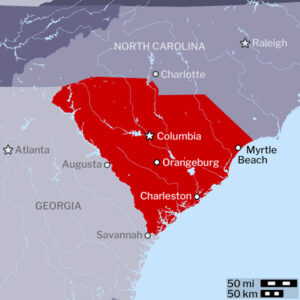 Nov 9: KKK holds rally and cross-burning at Orangeburg, South Carolina. A KKK meeting and cross-burning in an open field on U.S. Route 301 about six miles (10 km) south of Orangeburg, South Carolina, draws about 100 masked and robed klansmen and some 400 spectators. Jack Dempsey, of Augusta, Georgia, and a grand dragon with the Association of Georgia Klans, blames communism for racial unrest in the South. He says that the KKK and FBI are the only two organizations fighting communism in America. He claims that while his group stand for white supremacy, it is not opposed to Black progress as long as the two races live separately. The Association of Georgia Klans, which sometimes identifies itself as the Association of American Klans, has been making a move into establishing klaverns in South Carolina, which is the domain of its bitter rival, the Association of Carolina Klans. Dempsey refers to the August violence in Myrtle Beach and the beating of a bed-ridden Conway farmer two days ago, both events which have been linked to the Carolina Klans. Dempsey says, “There have been some things happening in the organization that we haven’t had any part of and don’t want anything to do with.”
Nov 9: KKK holds rally and cross-burning at Orangeburg, South Carolina. A KKK meeting and cross-burning in an open field on U.S. Route 301 about six miles (10 km) south of Orangeburg, South Carolina, draws about 100 masked and robed klansmen and some 400 spectators. Jack Dempsey, of Augusta, Georgia, and a grand dragon with the Association of Georgia Klans, blames communism for racial unrest in the South. He says that the KKK and FBI are the only two organizations fighting communism in America. He claims that while his group stand for white supremacy, it is not opposed to Black progress as long as the two races live separately. The Association of Georgia Klans, which sometimes identifies itself as the Association of American Klans, has been making a move into establishing klaverns in South Carolina, which is the domain of its bitter rival, the Association of Carolina Klans. Dempsey refers to the August violence in Myrtle Beach and the beating of a bed-ridden Conway farmer two days ago, both events which have been linked to the Carolina Klans. Dempsey says, “There have been some things happening in the organization that we haven’t had any part of and don’t want anything to do with.”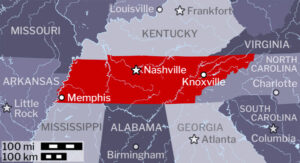 Nov 9: Cross burned outside of Nashville. A three-foot cross is discovered at Antioch and Ezell Roads, near Bakertown, Tennessee, about five miles (8 km) southeast of downtown Nashville. The cross, wrapped in burlap and stuck into the town beside the highway, is about a mile from where two homes being built for African-American families were bombed last December. The bombing, which halted the construction for good, has never been solved. An application for Klan membership is wrapped around a peg in the ground about three feet from the cross. On the back of the application is a note written in pencil: “We will not tolerate Negroes in our white schools. We are strong enough to prevent this.”
Nov 9: Cross burned outside of Nashville. A three-foot cross is discovered at Antioch and Ezell Roads, near Bakertown, Tennessee, about five miles (8 km) southeast of downtown Nashville. The cross, wrapped in burlap and stuck into the town beside the highway, is about a mile from where two homes being built for African-American families were bombed last December. The bombing, which halted the construction for good, has never been solved. An application for Klan membership is wrapped around a peg in the ground about three feet from the cross. On the back of the application is a note written in pencil: “We will not tolerate Negroes in our white schools. We are strong enough to prevent this.”▲Friday, November 10
![]()
 Nov 10: Korean War, Chosin Reservoir: Marines climb the Koto-ri plateau. For the past two days, U.S. Marines at the foot of Funchilin Pass have been sending out patrols looking for enemy troops. Coming up empty, they move up over the pass without opposition and occupy Koto-ro, which sits high atop its namesake plateau. They are now only seven miles (11 km) from Hagaru-ri at the base of the Chosin (Changjin) Reservoir. The first night at Koto-ri will hit the Marines with a brutal new reality. The temperatures during the afternoon and overnight drop 40 degrees (22°C) to -8°F (-22°C). With 30 to 35 m.p.h (50-55 km/h) winds, the wind chill is down to -38°F (-39°C). Over the next three or four days, 200 men will be in sick bay due to the severe cold. Water-based medicines freeze, and morphine can only be used when kept against the body. Plasma requires a sixty- to ninety-minute prep time in a warm tent before it can be used. High-energy foods, especially candy bars, are at a premium. This weather is only a foretaste of what is to come.
Nov 10: Korean War, Chosin Reservoir: Marines climb the Koto-ri plateau. For the past two days, U.S. Marines at the foot of Funchilin Pass have been sending out patrols looking for enemy troops. Coming up empty, they move up over the pass without opposition and occupy Koto-ro, which sits high atop its namesake plateau. They are now only seven miles (11 km) from Hagaru-ri at the base of the Chosin (Changjin) Reservoir. The first night at Koto-ri will hit the Marines with a brutal new reality. The temperatures during the afternoon and overnight drop 40 degrees (22°C) to -8°F (-22°C). With 30 to 35 m.p.h (50-55 km/h) winds, the wind chill is down to -38°F (-39°C). Over the next three or four days, 200 men will be in sick bay due to the severe cold. Water-based medicines freeze, and morphine can only be used when kept against the body. Plasma requires a sixty- to ninety-minute prep time in a warm tent before it can be used. High-energy foods, especially candy bars, are at a premium. This weather is only a foretaste of what is to come.
![]() Nov 10: Telephone workers go on strike. Thirty-three thousand members of the Communications Workers of America go on strike in forty-two states and the District of Columbia against two subsidiaries of American Telephone and Telegraph (AT&T). Technically, the strike only involves 16,000 employees at Michigan Bell and 17,000 workers at Western Electric, Ma Bell’s telephone equipment manufacturing arm. But union workers refuse to cross picket lines set up by the CWA at other AT&T facilities, which magnifies the strike’s impact. Long distance is curtailed somewhat. Communities with rotary dialing are little affected so far, but in New Jersey, where 42% of phones require an operator to make a call, only half of the normal volume of calls are being completed. With spreading picket lines at other AT&T facilities, the strike will spread to 120,000 workers the next day.
Nov 10: Telephone workers go on strike. Thirty-three thousand members of the Communications Workers of America go on strike in forty-two states and the District of Columbia against two subsidiaries of American Telephone and Telegraph (AT&T). Technically, the strike only involves 16,000 employees at Michigan Bell and 17,000 workers at Western Electric, Ma Bell’s telephone equipment manufacturing arm. But union workers refuse to cross picket lines set up by the CWA at other AT&T facilities, which magnifies the strike’s impact. Long distance is curtailed somewhat. Communities with rotary dialing are little affected so far, but in New Jersey, where 42% of phones require an operator to make a call, only half of the normal volume of calls are being completed. With spreading picket lines at other AT&T facilities, the strike will spread to 120,000 workers the next day.
![]() Nov 10: William Faulkner, Bertrand Russell win Nobel Prizes for literature. Faulkner, author of The Sound and the Fury, Sanctuary and Intruder in the Dust wins the prize for 1949, which was held over when the Swedish Academy failed to agree on a candidate. Faulkner is recognized “for his forceful and independently artistic contribution to modern American fiction.” The 1950 prize to British philosopher Bertrand Russell is “in recognition of his many-sided and significant authorship, in which he has constantly figured as a defender of humanity and freedom of thought.”
Nov 10: William Faulkner, Bertrand Russell win Nobel Prizes for literature. Faulkner, author of The Sound and the Fury, Sanctuary and Intruder in the Dust wins the prize for 1949, which was held over when the Swedish Academy failed to agree on a candidate. Faulkner is recognized “for his forceful and independently artistic contribution to modern American fiction.” The 1950 prize to British philosopher Bertrand Russell is “in recognition of his many-sided and significant authorship, in which he has constantly figured as a defender of humanity and freedom of thought.”
▲Saturday, November 11
Armistice Day (US)
Remembrance Day (Australia, Canada, UK)
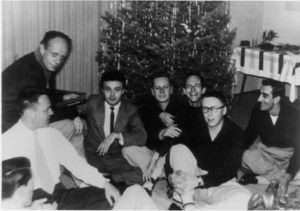 Nov 11: The Mattachine Foundation holds its first meeting. The first meeting for the forerunner of the Mattachine Society is held at Harry Hay’s home on Red Hill in Silver Lake. Five men — Hay, Rudi Gernreich, Bob Hull, Chick Rowland, and Dale Jennings — gather to form what they initially call the “Society of Fools.” The idea for the name comes from the idea that only the fool had the freedom to speak the truth to the all-powerful king. Hay’s idea was the create a group that could unify homosexuals to not only change the laws outlawing homosexual relationships, but also to “change the hearts of men, both homosexual and heterosexual.” Gruber suggests changing the name to the Mattachine Foundation, in honor of the medieval masque troops known as “matachines” (originally spelled with one “t”).
Nov 11: The Mattachine Foundation holds its first meeting. The first meeting for the forerunner of the Mattachine Society is held at Harry Hay’s home on Red Hill in Silver Lake. Five men — Hay, Rudi Gernreich, Bob Hull, Chick Rowland, and Dale Jennings — gather to form what they initially call the “Society of Fools.” The idea for the name comes from the idea that only the fool had the freedom to speak the truth to the all-powerful king. Hay’s idea was the create a group that could unify homosexuals to not only change the laws outlawing homosexual relationships, but also to “change the hearts of men, both homosexual and heterosexual.” Gruber suggests changing the name to the Mattachine Foundation, in honor of the medieval masque troops known as “matachines” (originally spelled with one “t”).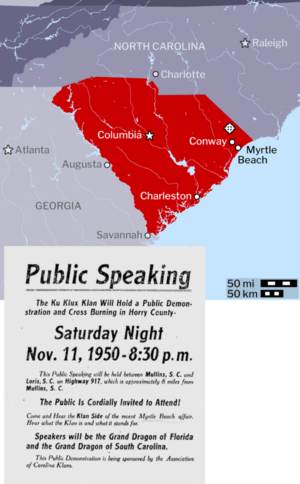 Nov 11: KKK holds mass rally near Conway, South Carolina. An estimated crowd of 5,000 to 8,000 people show up at a tobacco field on Highway 917 north of Conway, South Carolina, for a massive Ku Klux Klan rally and cross burning. They’ve come to hear Thomas Hamilton, Grand Dragon of the Association of Carolina Klans, tell his side of the story about the violence that broke out during a Klan motorcade at Myrtle Beach of last August. Following a shootout at a nightclub, off-duty Conway policeman Dan Johnson was found shot to death while still wearing his police uniform under his Klan robe. Hamilton says they were conducting a peaceful motorcade on public highways, but that Charlie Fitzergald, the operator of the dance hall where the shooting occurred, “dared” the Klan to return after it had made one pass by his place. “I am a white man,” says Hamilton, “and I don’t take a dare from a nigger.” He claims shots were fired at the Klan from inside the building and that the klansmen, being white Southern Americans, had no choice but to return fire. He also says that Johnson was a friend who “died in defense of his integrity.” He also says that the Klan is sending a monthly check to Johnson’s wife and children. Hamilton warns that while klansmen are proud members of the organization, not all of them wear their robes. “You better always be careful what you say because the man at your elbow may be a klansman.” He denies that the Klan was involved with the beating of Horry County farmer Rufus Lee and Lee’s two sons earlier this week. Hamilton then continues with a blistering attack on all of the world’s ills. He calls President Harry Truman a figurehead for the Jews. He criticizes Defense Secretary Gen. George C. Marshall for naming a Jew as assistant defense secretary. He blasts a Baptist preacher — Hamilton himself is an ordained Baptist deacon, he reminds the crowd — for preaching against the KKK, and he accuses South Carolina’s outgoing Gov. Strom Thurmond of associating with Communists, namely another Baptist who has written against the Klan. He says the YWCA is dominated by Jews and Communists. as are the NAACP and the Congress of Industrial Organizations (CIO). Bill Hendrix, Grand Dragon of the Association of Florida Klans, was supposed to appear at the rally, but he’s laid up in a Tallahassee hospital. He sends a recorded message blasting the Jews, the newspapers, and “a big Baptist preacher” in Anderson, South Carolina, “who likes to squawk about the Klan.” According to the Tabor City (NC) Tribune: “Hamilton’s speech was delivered from the back of a truck. He was surrounded on the platform by at least two women wearing red uniforms of the Klan and several men. At least 100 white robed Klansmen roamed around the speakers stand. An American flag draped the Bible on the stand and a 20-foot, burning cross was in back of the speaker. The cross burned throughout the address that lasted one hour and 25 minutes, starting at 8:30. A terrific traffic jam followed the meeting and many cars were not able to move for half an hour. Traffic was directed by white clothed Klansmen.”
Nov 11: KKK holds mass rally near Conway, South Carolina. An estimated crowd of 5,000 to 8,000 people show up at a tobacco field on Highway 917 north of Conway, South Carolina, for a massive Ku Klux Klan rally and cross burning. They’ve come to hear Thomas Hamilton, Grand Dragon of the Association of Carolina Klans, tell his side of the story about the violence that broke out during a Klan motorcade at Myrtle Beach of last August. Following a shootout at a nightclub, off-duty Conway policeman Dan Johnson was found shot to death while still wearing his police uniform under his Klan robe. Hamilton says they were conducting a peaceful motorcade on public highways, but that Charlie Fitzergald, the operator of the dance hall where the shooting occurred, “dared” the Klan to return after it had made one pass by his place. “I am a white man,” says Hamilton, “and I don’t take a dare from a nigger.” He claims shots were fired at the Klan from inside the building and that the klansmen, being white Southern Americans, had no choice but to return fire. He also says that Johnson was a friend who “died in defense of his integrity.” He also says that the Klan is sending a monthly check to Johnson’s wife and children. Hamilton warns that while klansmen are proud members of the organization, not all of them wear their robes. “You better always be careful what you say because the man at your elbow may be a klansman.” He denies that the Klan was involved with the beating of Horry County farmer Rufus Lee and Lee’s two sons earlier this week. Hamilton then continues with a blistering attack on all of the world’s ills. He calls President Harry Truman a figurehead for the Jews. He criticizes Defense Secretary Gen. George C. Marshall for naming a Jew as assistant defense secretary. He blasts a Baptist preacher — Hamilton himself is an ordained Baptist deacon, he reminds the crowd — for preaching against the KKK, and he accuses South Carolina’s outgoing Gov. Strom Thurmond of associating with Communists, namely another Baptist who has written against the Klan. He says the YWCA is dominated by Jews and Communists. as are the NAACP and the Congress of Industrial Organizations (CIO). Bill Hendrix, Grand Dragon of the Association of Florida Klans, was supposed to appear at the rally, but he’s laid up in a Tallahassee hospital. He sends a recorded message blasting the Jews, the newspapers, and “a big Baptist preacher” in Anderson, South Carolina, “who likes to squawk about the Klan.” According to the Tabor City (NC) Tribune: “Hamilton’s speech was delivered from the back of a truck. He was surrounded on the platform by at least two women wearing red uniforms of the Klan and several men. At least 100 white robed Klansmen roamed around the speakers stand. An American flag draped the Bible on the stand and a 20-foot, burning cross was in back of the speaker. The cross burned throughout the address that lasted one hour and 25 minutes, starting at 8:30. A terrific traffic jam followed the meeting and many cars were not able to move for half an hour. Traffic was directed by white clothed Klansmen.”▲Sunday, November 12
![]()
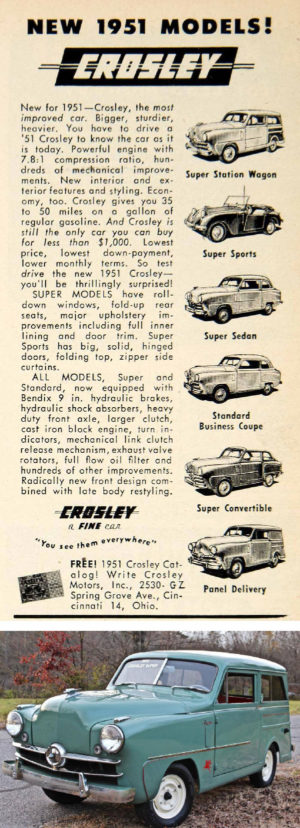 Nov 12: The innovative but now struggling Crosley Motors introduces a new diminutive station wagon to its subcompact lineup. Crosley Motors is a closely-held spin-off of Cincinnati-based Crosley Corporation, which is a well-known radio and home appliance manufacturer, and broadcaster (WLW was for many years the world’s most powerful broadcast station with listeners as far away as Germany). Crosley Motors makes subcompacts only, having introduced the first compact car to American consumers in 1939. The company has stuck with the 80-inch (203 cm) wheelbase ever since. The new station wagon, at just $1,133 (about $11,800 today), is the most expensive model in the lineup. Prices start at $998 ($10,400 today) for a small “business coupe.” A pickup truck can be had for the same price. Just a hundred dollars more ($1,040 today) can get you a Hotshot roadster, club convertible or “deluxe” sedan. A panel delivery truck is also available for $1,020 ($10,600 today). That gives you a small, affordable vehicle with a four-cylinder 26½ horsepower engine capable of cruising at 50 mph (80 km/h) and delivering between 35 to 50 miles per gallon (6.7 to 4.7 L/100km). Crosleys also feature electric windshield wipers, Bendix hydraulix brakes, and roll-up side windows. (Models before 1950 had sliding windows.) Crosleys were very popular with a car-starved public when civilian production resumed in 1946. Those post-war models used an innovative CoBra (for Copper Brazed) engine that was reliable for military use with regular maintenance. But civilians weren’t so diligent and corrosion became a problem. By 1949, Crosley’s reputation sank. Crosley replaced the CoBra with one using a traditional cast-iron block and made replacement engines available to owners of older models. Maenwhile, other American carmakers have introduced more lavish cars that are priced, in some cases, only a little more than a new Crosley. Sales of Crosleys plunge from a peak in 1948 of 27,707 cars to only 7,612 in 1950.
Nov 12: The innovative but now struggling Crosley Motors introduces a new diminutive station wagon to its subcompact lineup. Crosley Motors is a closely-held spin-off of Cincinnati-based Crosley Corporation, which is a well-known radio and home appliance manufacturer, and broadcaster (WLW was for many years the world’s most powerful broadcast station with listeners as far away as Germany). Crosley Motors makes subcompacts only, having introduced the first compact car to American consumers in 1939. The company has stuck with the 80-inch (203 cm) wheelbase ever since. The new station wagon, at just $1,133 (about $11,800 today), is the most expensive model in the lineup. Prices start at $998 ($10,400 today) for a small “business coupe.” A pickup truck can be had for the same price. Just a hundred dollars more ($1,040 today) can get you a Hotshot roadster, club convertible or “deluxe” sedan. A panel delivery truck is also available for $1,020 ($10,600 today). That gives you a small, affordable vehicle with a four-cylinder 26½ horsepower engine capable of cruising at 50 mph (80 km/h) and delivering between 35 to 50 miles per gallon (6.7 to 4.7 L/100km). Crosleys also feature electric windshield wipers, Bendix hydraulix brakes, and roll-up side windows. (Models before 1950 had sliding windows.) Crosleys were very popular with a car-starved public when civilian production resumed in 1946. Those post-war models used an innovative CoBra (for Copper Brazed) engine that was reliable for military use with regular maintenance. But civilians weren’t so diligent and corrosion became a problem. By 1949, Crosley’s reputation sank. Crosley replaced the CoBra with one using a traditional cast-iron block and made replacement engines available to owners of older models. Maenwhile, other American carmakers have introduced more lavish cars that are priced, in some cases, only a little more than a new Crosley. Sales of Crosleys plunge from a peak in 1948 of 27,707 cars to only 7,612 in 1950.
▲Monday, November 13
![]()
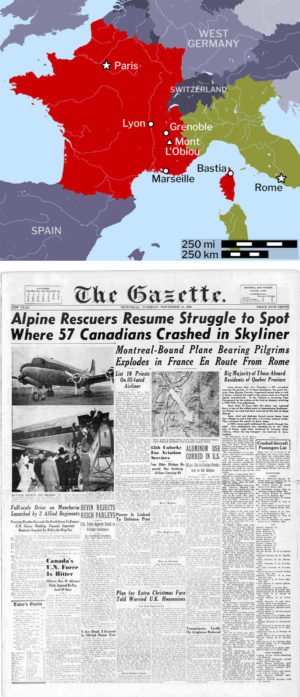 Nov 13: Airliner carrying Canadian pilgrims crashes in the French Alps. A Curtiss-Reid Flying Service DC-4 airliner crashes in the French Alps, killing all 51 passengers and seven crewmembers on board. The Canadian plane’s passengers are Holy Year pilgrims flying from Rome to Paris for the first leg of their return trip to Montreal. All but one on board are Canadian, and almost all of the Canadians are Québécois, fourteen of them priests. The pilgrims had gone to Rome for the beatification last Sunday of Marguerite Bourgeoys, the French-born nun who moved to Montreal 300 years ago to found the congregation of Notre Dame. They were supposed to leave earlier in the morning, but their departure was delayed four hours to give them time for a final audience with the Pope. The plane takes off from Rome’s Ciampino Airport at 2:15 p.m. and is due at Orly Field at 7:25. The plane’s flight plan has it going from Rome to Bastia, Corsica, then to Marseille, Lyon and Paris. But it appears that the pilot is trying to make up for lost time by flying straight from Bastia to Lyon, which brings the aircraft much closer to the Alps. The plane crashes into the cloud-shrouded Mont L’Obiou, an 8,500-foot (2600 m) peak about 30 miles (50 km) south of Grenoble in southern France. The airliner has made thirty Holy Year round trip flights between Montreal and Rome since April, when it was christened “Canadian Pilgrim.” A special requiem mass will be said in St. Peter’s Basilica on Thursday.
Nov 13: Airliner carrying Canadian pilgrims crashes in the French Alps. A Curtiss-Reid Flying Service DC-4 airliner crashes in the French Alps, killing all 51 passengers and seven crewmembers on board. The Canadian plane’s passengers are Holy Year pilgrims flying from Rome to Paris for the first leg of their return trip to Montreal. All but one on board are Canadian, and almost all of the Canadians are Québécois, fourteen of them priests. The pilgrims had gone to Rome for the beatification last Sunday of Marguerite Bourgeoys, the French-born nun who moved to Montreal 300 years ago to found the congregation of Notre Dame. They were supposed to leave earlier in the morning, but their departure was delayed four hours to give them time for a final audience with the Pope. The plane takes off from Rome’s Ciampino Airport at 2:15 p.m. and is due at Orly Field at 7:25. The plane’s flight plan has it going from Rome to Bastia, Corsica, then to Marseille, Lyon and Paris. But it appears that the pilot is trying to make up for lost time by flying straight from Bastia to Lyon, which brings the aircraft much closer to the Alps. The plane crashes into the cloud-shrouded Mont L’Obiou, an 8,500-foot (2600 m) peak about 30 miles (50 km) south of Grenoble in southern France. The airliner has made thirty Holy Year round trip flights between Montreal and Rome since April, when it was christened “Canadian Pilgrim.” A special requiem mass will be said in St. Peter’s Basilica on Thursday.
![]()
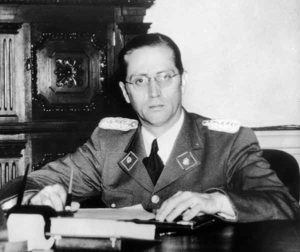 Nov 13: Venezuela President assassinated. Lt. Col. Carlos Delgado Chalbaud, president of Venezuela’s ruling military triumvirate, is kidnapped and assassinated in Caracas. He is abducted in the Country Club district of Caracas, and he is murdered, apparently unintentionally, in the semi-abandoned Las Mercedes neighborhood. Rafael Simón Urbina, the ringleader of Chalbaud’s captors, is captured by Venezuelan government forces and assassinated that night while being transferred from one prison for another. Marcos Pérez Jiménez, one of the two remaining junta members, will rise to become Venezuela’s strongman behind the titular President, Germán Suárez Flamerich.
Nov 13: Venezuela President assassinated. Lt. Col. Carlos Delgado Chalbaud, president of Venezuela’s ruling military triumvirate, is kidnapped and assassinated in Caracas. He is abducted in the Country Club district of Caracas, and he is murdered, apparently unintentionally, in the semi-abandoned Las Mercedes neighborhood. Rafael Simón Urbina, the ringleader of Chalbaud’s captors, is captured by Venezuelan government forces and assassinated that night while being transferred from one prison for another. Marcos Pérez Jiménez, one of the two remaining junta members, will rise to become Venezuela’s strongman behind the titular President, Germán Suárez Flamerich.
▲Tuesday, November 14
![]()
 Nov 14: Korean War, Chosin Reservoir: U.S. Marines occupy Hagaru-ri. U.S. Marines have trudged slowly north from Koto-ri on a snow-covered road in subzero temperatures. Vehicles’ brakes freeze up, transmissions balk, and the soldiers themselves find it difficult to move forward in the weather. When they finally reach Hagaru-ri, they find a mostly abandoned village that has been practically leveled in previous bombing attacks. The few residents who remain say that about three thousand occupying Chinese soldiers left the town three days ago and retreated to the north and west. That night, the temperature will drop to -15°F (-26°C).
Nov 14: Korean War, Chosin Reservoir: U.S. Marines occupy Hagaru-ri. U.S. Marines have trudged slowly north from Koto-ri on a snow-covered road in subzero temperatures. Vehicles’ brakes freeze up, transmissions balk, and the soldiers themselves find it difficult to move forward in the weather. When they finally reach Hagaru-ri, they find a mostly abandoned village that has been practically leveled in previous bombing attacks. The few residents who remain say that about three thousand occupying Chinese soldiers left the town three days ago and retreated to the north and west. That night, the temperature will drop to -15°F (-26°C).
![]() Nov 14: Korean War, Northeast: American forces try to attack north of Pungsan to Hyesanjin. But first they must cross the Ungi River. Ordinarily, the Ungi isn’t much of a barrier. But after the North Koreans released water from a reservoir upstream a shallow ford is now waste deep. American troops begin wading across in -7°F (-22°C) weather, and it soon becomes apparent that anyone enter the water will soon be frozen and out of action. Their clothes have to be cut from them, and they have to be wrapped in blankets and taken to warming tents to recover. Casualties from this abortive crossing attempt are one killed, six wounded, and eighteen suffering from frostbite. They will attempt a crossing the next day using a plank footbridge floating on barrels. Also the next day, the U.S. 7th Division will order up 250 squad tents and 500 oil-burning stoves for immediate delivery. In order to keep vehicle gasoline lines and carburetors from freezing, it is necessary to mix alcohol or alcohol-based antifreeze with gasoline. Meanwhile, South Korean troops that took Kilchu in Korea’s far northeast last week, strike inland to the northwest and are within thirty-five miles (55 km) of the Chinese border.
Nov 14: Korean War, Northeast: American forces try to attack north of Pungsan to Hyesanjin. But first they must cross the Ungi River. Ordinarily, the Ungi isn’t much of a barrier. But after the North Koreans released water from a reservoir upstream a shallow ford is now waste deep. American troops begin wading across in -7°F (-22°C) weather, and it soon becomes apparent that anyone enter the water will soon be frozen and out of action. Their clothes have to be cut from them, and they have to be wrapped in blankets and taken to warming tents to recover. Casualties from this abortive crossing attempt are one killed, six wounded, and eighteen suffering from frostbite. They will attempt a crossing the next day using a plank footbridge floating on barrels. Also the next day, the U.S. 7th Division will order up 250 squad tents and 500 oil-burning stoves for immediate delivery. In order to keep vehicle gasoline lines and carburetors from freezing, it is necessary to mix alcohol or alcohol-based antifreeze with gasoline. Meanwhile, South Korean troops that took Kilchu in Korea’s far northeast last week, strike inland to the northwest and are within thirty-five miles (55 km) of the Chinese border.
▲Wednesday, November 15
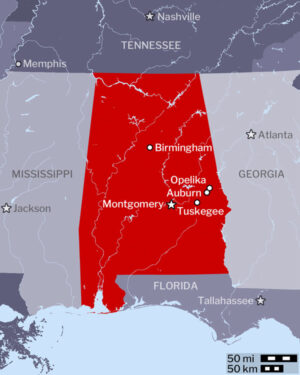 Nov 15: At least four crosses burn at Opelika, Alabama. One cross is burned in the yard of a black church off the newly paved Opelika-Auburn road near the airport. A call reporting that cross comes in to the sheriff’s office at about 11:40 p.m. No one living nearby say they saw anything. Three other crosses are burned in Opelika in front of African-American homes. One was on McCoy Street in front of the home of 82-year-old Sarah Davis. She lives alone. Police Chief Floyd Mann describes her as a “harmless” and “respected old Negro,” and says he doesn’t understand why she would be singled out by the Klan. He adds that there aren’y any other houses close enough to Davis’s home for anyone to be confused. Two other crosses are burned in front of Black homes on the Old Columbus Road just beyond Dudley’s store. Joe Doolittle, a foundry worker, isn’t home, but his wife and five children are. He says his wife was attracted to the front window by the burning cross’s reflection. The cross is just fifty feet (15 m) from the front steps. Across the old Columbus road but down a ways and out of sight of the Doolittle home, another cross is lit at Albert Payne’s home. Payne, also a foundry worker, isn’t home, but his wife and eight children are. Both men say they can think of no reason why crosses would be burned. In all three cases, the victims say that the crosses are burned by unrobed men arriving and leaving in three cars and a pickup truck. They say that none of the men said anything during their impromptu ceremonies. Last month, a ten-car Klan motorcade paraded through Opelika, stopping at one house to warn the resident to leave town. A larger forty to fifty-car Klan caravan, accompanied by a police escort, took place in the city’s southern neighborhoods last January, which caused a tremendous public outcry at the time. These more recent events arouse little public comment.
Nov 15: At least four crosses burn at Opelika, Alabama. One cross is burned in the yard of a black church off the newly paved Opelika-Auburn road near the airport. A call reporting that cross comes in to the sheriff’s office at about 11:40 p.m. No one living nearby say they saw anything. Three other crosses are burned in Opelika in front of African-American homes. One was on McCoy Street in front of the home of 82-year-old Sarah Davis. She lives alone. Police Chief Floyd Mann describes her as a “harmless” and “respected old Negro,” and says he doesn’t understand why she would be singled out by the Klan. He adds that there aren’y any other houses close enough to Davis’s home for anyone to be confused. Two other crosses are burned in front of Black homes on the Old Columbus Road just beyond Dudley’s store. Joe Doolittle, a foundry worker, isn’t home, but his wife and five children are. He says his wife was attracted to the front window by the burning cross’s reflection. The cross is just fifty feet (15 m) from the front steps. Across the old Columbus road but down a ways and out of sight of the Doolittle home, another cross is lit at Albert Payne’s home. Payne, also a foundry worker, isn’t home, but his wife and eight children are. Both men say they can think of no reason why crosses would be burned. In all three cases, the victims say that the crosses are burned by unrobed men arriving and leaving in three cars and a pickup truck. They say that none of the men said anything during their impromptu ceremonies. Last month, a ten-car Klan motorcade paraded through Opelika, stopping at one house to warn the resident to leave town. A larger forty to fifty-car Klan caravan, accompanied by a police escort, took place in the city’s southern neighborhoods last January, which caused a tremendous public outcry at the time. These more recent events arouse little public comment.![]()
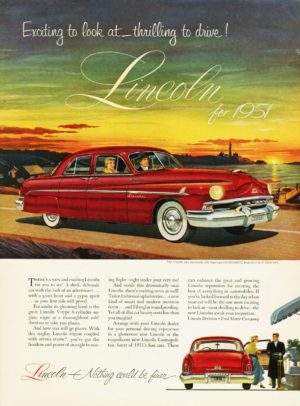 Nov 15: New Lincolns go on display at Lincoln-Mercury dealerships. The 1951 models feature smart new styling, with new rear quarter panels and fenders designed to give it a longer, lower, and more streamlined shape. A redesigned roof panel accommodates a 29% larger curved rear window. Changes extend to the front bumpers, grille, and interior appointments. Two models are available, the Lincoln and the Cosmopolitan. All Lincolns and Lincoln Cosmopolitans feature V-8 engines delivering 154 horsepower. The Lincoln six passenger coupe starts at $2,621 (about $27,200 today), and the Cosmopolitan starts at $3,285 (about 34,100 today). The Cosmopolitan convertible tops out at $4,052 (about $42,100 today).
Nov 15: New Lincolns go on display at Lincoln-Mercury dealerships. The 1951 models feature smart new styling, with new rear quarter panels and fenders designed to give it a longer, lower, and more streamlined shape. A redesigned roof panel accommodates a 29% larger curved rear window. Changes extend to the front bumpers, grille, and interior appointments. Two models are available, the Lincoln and the Cosmopolitan. All Lincolns and Lincoln Cosmopolitans feature V-8 engines delivering 154 horsepower. The Lincoln six passenger coupe starts at $2,621 (about $27,200 today), and the Cosmopolitan starts at $3,285 (about 34,100 today). The Cosmopolitan convertible tops out at $4,052 (about $42,100 today).
▲Thursday, November 16
![]() Nov 16: Truman says U.S. will not invade China. In a statement at the start of a press conference, President Harry Truman says, “Speaking for the United States Government and the people, I can give assurance that we support and are acting within the limits of United Nations policy in Korea, and that we have never at any time entertained any intention to carry hostilities into China. … I wish to state unequivocally that because of our deep devotion to the cause of world peace and our long-standing friendship for the people of China, we will take every honorable step to prevent any extension of the hostilities in the Far East.” Truman says that despite U.N. resolutions that limit the scope of action in Korea to preclude any incursion into China, U.N. forces “are being attacked from the safety of a privileged sanctuary. Planes operating from bases in China cross over into Korea to attack United Nations ground and air forces and then flee back across the border. Chinese Communist and North Korean Communist forces are being reinforced, supplied and equipped from bases behind the safety of the Sino-Korean border.” Truman warns that “a desire for peace, in order to be effective, must be shared by all concerned.” If China desires peace, “they will not take upon themselves the responsibility for obstructing the objectives of the United Nations in Korea.”
Nov 16: Truman says U.S. will not invade China. In a statement at the start of a press conference, President Harry Truman says, “Speaking for the United States Government and the people, I can give assurance that we support and are acting within the limits of United Nations policy in Korea, and that we have never at any time entertained any intention to carry hostilities into China. … I wish to state unequivocally that because of our deep devotion to the cause of world peace and our long-standing friendship for the people of China, we will take every honorable step to prevent any extension of the hostilities in the Far East.” Truman says that despite U.N. resolutions that limit the scope of action in Korea to preclude any incursion into China, U.N. forces “are being attacked from the safety of a privileged sanctuary. Planes operating from bases in China cross over into Korea to attack United Nations ground and air forces and then flee back across the border. Chinese Communist and North Korean Communist forces are being reinforced, supplied and equipped from bases behind the safety of the Sino-Korean border.” Truman warns that “a desire for peace, in order to be effective, must be shared by all concerned.” If China desires peace, “they will not take upon themselves the responsibility for obstructing the objectives of the United Nations in Korea.”
▲Friday, November 17
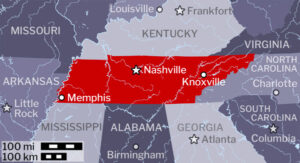 Nov 17: Second cross burned outside of Nashville. A six-foot (2 m) cross, surrounded by a dozen unmasked men, is reported burned by the side of the Clarksville highway five miles from Bordeaux, Tennessee. Bordeaux sits just across the Cumberland River from North Nashville, an African-American neighborhood that is home to the historic black Fisk University and Tennessee Agricultural and Industrial State College. The cross is burned just beyond Dry Fork bridge, in front of a house that is under construction. A motorist says he passed the burning cross while on his way into Nashville but didn’t stop to check it out because of the men gathered around it. A handbill is later found at the cross, urging those wishing to join the clan to write to a Birmingham, Alabama post office box. This is the same post office box printed on leaflets that circulated throughout Nashville last August when three crosses were burned around the city. This handbill reads, “We the Klan of Cheatham and Montgomery counties intend to keep communism out of our country and straighten up our unlawful citizens.” It also says, “Keep Negroes out of our school.” This is the second cross to be burned in the Nashville area in the past week.
Nov 17: Second cross burned outside of Nashville. A six-foot (2 m) cross, surrounded by a dozen unmasked men, is reported burned by the side of the Clarksville highway five miles from Bordeaux, Tennessee. Bordeaux sits just across the Cumberland River from North Nashville, an African-American neighborhood that is home to the historic black Fisk University and Tennessee Agricultural and Industrial State College. The cross is burned just beyond Dry Fork bridge, in front of a house that is under construction. A motorist says he passed the burning cross while on his way into Nashville but didn’t stop to check it out because of the men gathered around it. A handbill is later found at the cross, urging those wishing to join the clan to write to a Birmingham, Alabama post office box. This is the same post office box printed on leaflets that circulated throughout Nashville last August when three crosses were burned around the city. This handbill reads, “We the Klan of Cheatham and Montgomery counties intend to keep communism out of our country and straighten up our unlawful citizens.” It also says, “Keep Negroes out of our school.” This is the second cross to be burned in the Nashville area in the past week.![]() Nov 17: Dalai Lama invested with temporal power in Tibet. Fifteen-year-old Tenzin Gyatso is formally enthroned as 14th Dalai Lama, making him the temporal ruler of Tibet. He is given full ruling powers in Tibet a hear and a half ahead of schedule in order to guide the province while Chinese Communist forces are marching on Lhasa, the capital, after entering eastern Tibet last month. The Dalai Lama’s ascension to the throne will put an end to the political paralysis that has gripped Tibet, which until now has been ruled by the unpopular regent Takta Rimpoche.
Nov 17: Dalai Lama invested with temporal power in Tibet. Fifteen-year-old Tenzin Gyatso is formally enthroned as 14th Dalai Lama, making him the temporal ruler of Tibet. He is given full ruling powers in Tibet a hear and a half ahead of schedule in order to guide the province while Chinese Communist forces are marching on Lhasa, the capital, after entering eastern Tibet last month. The Dalai Lama’s ascension to the throne will put an end to the political paralysis that has gripped Tibet, which until now has been ruled by the unpopular regent Takta Rimpoche.
▲Saturday, November 18
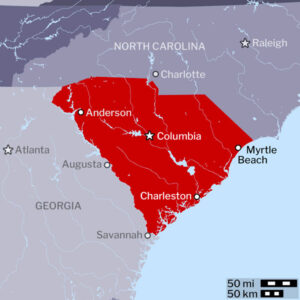 Nov 18: Cross burned at Baptist preacher’s home. At about 1:00 a.m., Anderson, South Carolina, police are called to the home of Rev. J. Horace Brown, pastor of Northside Baptist Church. A policeman arrives to find a four-foot smoldering cross. News reports of last week’s big Klan rally near Conway quoted Bill Hendrix, Grand Dragon of the Florida Klans who spoke via a recorded message, as saying that “at Anderson there’s a big Baptist preacher who likes to squawk about the Klan.” Hendrix later confirmed that he was talking about Brown. Brown dismisses the connection. “I am inclined to think however, that it is the work of some cheap, cowardly prankster.”
Nov 18: Cross burned at Baptist preacher’s home. At about 1:00 a.m., Anderson, South Carolina, police are called to the home of Rev. J. Horace Brown, pastor of Northside Baptist Church. A policeman arrives to find a four-foot smoldering cross. News reports of last week’s big Klan rally near Conway quoted Bill Hendrix, Grand Dragon of the Florida Klans who spoke via a recorded message, as saying that “at Anderson there’s a big Baptist preacher who likes to squawk about the Klan.” Hendrix later confirmed that he was talking about Brown. Brown dismisses the connection. “I am inclined to think however, that it is the work of some cheap, cowardly prankster.”![]()
 Nov 18: Korean War, Chosin Reservoir: U.S. forces strengthen positions at Chosin, Pujon Reservoirs. The U.S. 31st Infantry Regiment, which left Pungsan ten days ago, advanced across a virtually roadless mountainous terrain using ox-drawn sleds to transport supplies and evacuate the wounded, finally arrived at the eastern shores of the Pujon Reservoir two days ago. After a brief firefight with Chinese troops on the northern end of the reservoir, the U.S. forces have fanned out to patrol both sides of the reservoir while leaving strong detachments to guard the mountain passes to the east. At the Chosin (Changjin) Reservoir, U.S. Marines have halted their advance at Hagaru-ri. They pause to build a primitive airstrip on the town’s southern edge. Other units work to improve the road south to Hamhung, allowing the first supply trucks to arrive at Hagaru-ri.
Nov 18: Korean War, Chosin Reservoir: U.S. forces strengthen positions at Chosin, Pujon Reservoirs. The U.S. 31st Infantry Regiment, which left Pungsan ten days ago, advanced across a virtually roadless mountainous terrain using ox-drawn sleds to transport supplies and evacuate the wounded, finally arrived at the eastern shores of the Pujon Reservoir two days ago. After a brief firefight with Chinese troops on the northern end of the reservoir, the U.S. forces have fanned out to patrol both sides of the reservoir while leaving strong detachments to guard the mountain passes to the east. At the Chosin (Changjin) Reservoir, U.S. Marines have halted their advance at Hagaru-ri. They pause to build a primitive airstrip on the town’s southern edge. Other units work to improve the road south to Hamhung, allowing the first supply trucks to arrive at Hagaru-ri.
![]() Nov 18: Korean War, Northeast: South Korea, U.S. continue drive to Hyesanjin. U.S. forces, after finally crossing the Ungi River north of Pungsan, move slowly up toward Kapsan. They will seize the town the following morning after a coordinated infantry, tank and artillery attack. By nightfall, they will be eight miles (13 km) north of Kapsan, and only twenty-three road miles (37 km) from Hyesanjin, which sits on the Yalu River and the border with China. South Korean forces expand their drives from the northeast coastal road in two directions. One force is pressing inland northwest from Hapsu to Hyesanjin, while the other remains on the coastal road and moves northeast to the industrial city of Chongjin.
Nov 18: Korean War, Northeast: South Korea, U.S. continue drive to Hyesanjin. U.S. forces, after finally crossing the Ungi River north of Pungsan, move slowly up toward Kapsan. They will seize the town the following morning after a coordinated infantry, tank and artillery attack. By nightfall, they will be eight miles (13 km) north of Kapsan, and only twenty-three road miles (37 km) from Hyesanjin, which sits on the Yalu River and the border with China. South Korean forces expand their drives from the northeast coastal road in two directions. One force is pressing inland northwest from Hapsu to Hyesanjin, while the other remains on the coastal road and moves northeast to the industrial city of Chongjin.
▲Sunday, November 19
![]() Nov 19: Telephone workers strike ends. The nationwide strike against American Telephone and Telegraph (AT&T) and several of its subsidiaries ends when the Communication Workers of America and AT&T reaches an agreement after a twenty-five-hour marathon negotiation session. Average wages at the Western Electric manufacturing division will go up about 11.3¢ per hour (about $1.20 today). The old contract set wages at $1.55 ($16.20 today) to $1.62 ($17.00 today) per hour. Wages at Michigan Bell will go up $3 ($32 today) to $5 ($53 today) per week, and pay will be equalized for workers in sixty-three towns outside of Detroit with workers in the city. The disparity has been a source of friction for years, but now wages in some towns will rise as much as $9 ($100 today) per week. Technically, only 33,000 workers at Western Electric and Michigan Bell went on strike ten days ago. But workers at other AT&T divisions have been honoring picket lines whenever they appear at their workplaces.
Nov 19: Telephone workers strike ends. The nationwide strike against American Telephone and Telegraph (AT&T) and several of its subsidiaries ends when the Communication Workers of America and AT&T reaches an agreement after a twenty-five-hour marathon negotiation session. Average wages at the Western Electric manufacturing division will go up about 11.3¢ per hour (about $1.20 today). The old contract set wages at $1.55 ($16.20 today) to $1.62 ($17.00 today) per hour. Wages at Michigan Bell will go up $3 ($32 today) to $5 ($53 today) per week, and pay will be equalized for workers in sixty-three towns outside of Detroit with workers in the city. The disparity has been a source of friction for years, but now wages in some towns will rise as much as $9 ($100 today) per week. Technically, only 33,000 workers at Western Electric and Michigan Bell went on strike ten days ago. But workers at other AT&T divisions have been honoring picket lines whenever they appear at their workplaces.
▲Monday, November 20
![]()
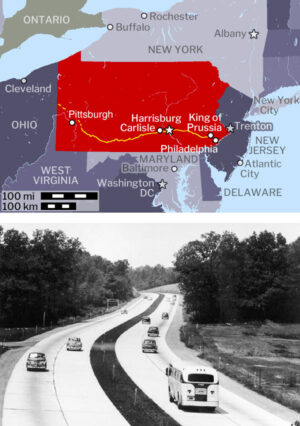 Nov 20: Eastern extension of Pennsylvania Turnpike opens. At 7:00 a.m. temporary barriers are removed from all nine toll gates between Carlisle and the Valley Forge interchange near King of Prussia, opening a new 100-mile (160 km) stretch of the Pennsylvania Turnpike. The new segment extends the ten-year-old original turnpike that runs 160 miles (260 km) from Carlisle to Irwin, a small town thirty miles (48 km) east of Pittsburgh. The expressway, the longest in the world, gives motorists the unheard-of ability to travel legally at up to 70 miles per hour (112 km/h) for 260 miles (420 km) without encountering a single stoplight, intersection, railroad crossing, sharp curve or steep hill. Three sailors, Robert Malcolm and William Nelson of Detroit, and Lawrence Mohan of Pittsburgh, are the first to cover the entire distance. Bound for the Philadelphia Naval Base, they get on the highway at Irwin and arrive at the new Carlisle toll booth just in time to become the first in line when it is opened. When they reach the Valley Forge interchange, their toll card shows they have made the 260 miles in 230 minutes, at an average speed of 68 miles per hour (109 km/h). The toll for the entire distance is $2.50 (about $26 today). An eastern extension to the Ohio state line is under construction and will open in December, 1951. Many of the features of this limited access, four-lane divided highway will find their way into the design standards for the Interstate Highway System later in the decade.
Nov 20: Eastern extension of Pennsylvania Turnpike opens. At 7:00 a.m. temporary barriers are removed from all nine toll gates between Carlisle and the Valley Forge interchange near King of Prussia, opening a new 100-mile (160 km) stretch of the Pennsylvania Turnpike. The new segment extends the ten-year-old original turnpike that runs 160 miles (260 km) from Carlisle to Irwin, a small town thirty miles (48 km) east of Pittsburgh. The expressway, the longest in the world, gives motorists the unheard-of ability to travel legally at up to 70 miles per hour (112 km/h) for 260 miles (420 km) without encountering a single stoplight, intersection, railroad crossing, sharp curve or steep hill. Three sailors, Robert Malcolm and William Nelson of Detroit, and Lawrence Mohan of Pittsburgh, are the first to cover the entire distance. Bound for the Philadelphia Naval Base, they get on the highway at Irwin and arrive at the new Carlisle toll booth just in time to become the first in line when it is opened. When they reach the Valley Forge interchange, their toll card shows they have made the 260 miles in 230 minutes, at an average speed of 68 miles per hour (109 km/h). The toll for the entire distance is $2.50 (about $26 today). An eastern extension to the Ohio state line is under construction and will open in December, 1951. Many of the features of this limited access, four-lane divided highway will find their way into the design standards for the Interstate Highway System later in the decade.
▲Tuesday, November 21
![]()
 Nov 21: Korean War, Northeast: U.S. troops reach the Manchurian border. Soldiers of the 17th Regiment, U.S. 7th Infantry Division, brush aside scant resistance to capture the town of Hyesanjin on the Yalu River. They had marched yesterday on foot nineteen miles (30 km) over ice-covered mountain roads and were within just a couple of miles of the border when night fell. Marine Corps Gen. Edward Almond, X Corps commander in northeastern Korea, had flown into Kapsan the day before. Almond, together with 7th Division Commander Maj. Gen. David Barr and regiment commander Col. Herbert B. Powell, accompany lead elements of the regiment into the town, which has been badly battered by several aerial bombing attacks. On the other side of the mostly-frozen river and about 300 yards (310 m) upstream, they can see Chang-pai (Changbai), a larger undamaged Chinese village, where Chinese sentries calmly walk their rounds. Back at Tokyo, U.N. Supreme Commander Gen. Douglas MacArthur sends Almond his congratulations. “The fact that only twenty days ago this division landed amphibiously over the beaches at Iwon and advanced 200 miles over tortuous mountain terrain and fought successfully against a determined foe in subzero weather will be recorded in history as an outstanding military achievement.” This is the second time U.N. forces have reached the Chinese border. A reconnaissance platoon of the South Korean 6th Division made it briefly to Chosan last month, but it was forced to withdraw due to surprise Chinese attacks to the south.
Nov 21: Korean War, Northeast: U.S. troops reach the Manchurian border. Soldiers of the 17th Regiment, U.S. 7th Infantry Division, brush aside scant resistance to capture the town of Hyesanjin on the Yalu River. They had marched yesterday on foot nineteen miles (30 km) over ice-covered mountain roads and were within just a couple of miles of the border when night fell. Marine Corps Gen. Edward Almond, X Corps commander in northeastern Korea, had flown into Kapsan the day before. Almond, together with 7th Division Commander Maj. Gen. David Barr and regiment commander Col. Herbert B. Powell, accompany lead elements of the regiment into the town, which has been badly battered by several aerial bombing attacks. On the other side of the mostly-frozen river and about 300 yards (310 m) upstream, they can see Chang-pai (Changbai), a larger undamaged Chinese village, where Chinese sentries calmly walk their rounds. Back at Tokyo, U.N. Supreme Commander Gen. Douglas MacArthur sends Almond his congratulations. “The fact that only twenty days ago this division landed amphibiously over the beaches at Iwon and advanced 200 miles over tortuous mountain terrain and fought successfully against a determined foe in subzero weather will be recorded in history as an outstanding military achievement.” This is the second time U.N. forces have reached the Chinese border. A reconnaissance platoon of the South Korean 6th Division made it briefly to Chosan last month, but it was forced to withdraw due to surprise Chinese attacks to the south.
![]()
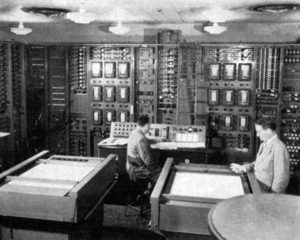 Nov 21: RCA and Navy demonstrate new 4,000-tube “brain.” The Radio Corporation of America and the Navy’s Special Devices Center jointly demonstrate “Project Typhoon,” described as “the largest and most accurate electronic analogue computer ever built.” An analogue computer uses continuously changeable outputs from electrical amplifiers, oscillators, capacitors, inductors, resisters and other electronic components to set up signals that mimic mathematical equations. In contrast, a digital computer uses ones and zeros to perform calculations and logical tasks. But digital computers are very slow at performing complex mathematical tasks when compared to analogue computers (at least in the 1950s), while analogue computers can operate at high speeds. They are particularly useful because they can more easily performing a wide variety of simulations involving differential equations. RCA and the Navy’s Special Devices Center say this computer was “built to evaluate the performance of guided missiles and other objects that move through the air or water, as well as to aid in the air protection of American cities.” Project leaders say it can solve in one minute problems that would require two mathematicians six months to complete. Project Typhoon employs 4,000 vacuum tubes, several miles of intricate wiring, and a set of extremely accurate components to model the simulations. Programming it involves setting 100 dials and 6,000 plug-in connectors. Operating it requires six technicians and nine engineers and mathematicians. It took three years to design and build. At today’s demonstration, the computer runs a simulated air attack by a radar-controlled supersonic missile against a high-speed bomber.
Nov 21: RCA and Navy demonstrate new 4,000-tube “brain.” The Radio Corporation of America and the Navy’s Special Devices Center jointly demonstrate “Project Typhoon,” described as “the largest and most accurate electronic analogue computer ever built.” An analogue computer uses continuously changeable outputs from electrical amplifiers, oscillators, capacitors, inductors, resisters and other electronic components to set up signals that mimic mathematical equations. In contrast, a digital computer uses ones and zeros to perform calculations and logical tasks. But digital computers are very slow at performing complex mathematical tasks when compared to analogue computers (at least in the 1950s), while analogue computers can operate at high speeds. They are particularly useful because they can more easily performing a wide variety of simulations involving differential equations. RCA and the Navy’s Special Devices Center say this computer was “built to evaluate the performance of guided missiles and other objects that move through the air or water, as well as to aid in the air protection of American cities.” Project leaders say it can solve in one minute problems that would require two mathematicians six months to complete. Project Typhoon employs 4,000 vacuum tubes, several miles of intricate wiring, and a set of extremely accurate components to model the simulations. Programming it involves setting 100 dials and 6,000 plug-in connectors. Operating it requires six technicians and nine engineers and mathematicians. It took three years to design and build. At today’s demonstration, the computer runs a simulated air attack by a radar-controlled supersonic missile against a high-speed bomber.
▲Wednesday, November 22
![]()
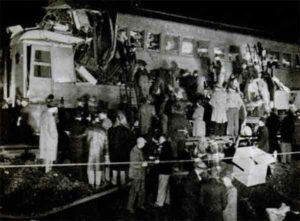 Nov 22: Seventy-eight killed in commuter train wreck. A Long Island Rail Road commuter train, which had stopped on the tracks while a motorman struggled to release a grabbing air brake, is rammed from behind by another train. The crash occurs on the railroad’s mail line in Queens, between the Kew Gardens and Jamaica stations. Seventy-eight are killed, including everyone in the last car of the stopped train. Thirteen are critically injured, and 350 others are hurt in the worst train wreck in New York history.
Nov 22: Seventy-eight killed in commuter train wreck. A Long Island Rail Road commuter train, which had stopped on the tracks while a motorman struggled to release a grabbing air brake, is rammed from behind by another train. The crash occurs on the railroad’s mail line in Queens, between the Kew Gardens and Jamaica stations. Seventy-eight are killed, including everyone in the last car of the stopped train. Thirteen are critically injured, and 350 others are hurt in the worst train wreck in New York history.
![]() Nov 22: Shirley Temple announces her retirement from show business.
Nov 22: Shirley Temple announces her retirement from show business.
▲Thursday, November 23
Thanksgiving (US)
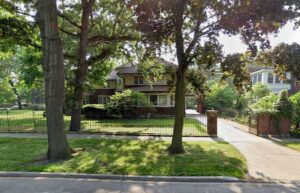 Nov 23: Arsonists strike at noted black research chemist’s Chicago home. Police in the upscale Chicago suburb of Oak Park say that efforts to burn a 15-room mansion recently purchased by Dr. Percy Julian failed in two separate attempts. Dr. Julian, internationally-known Africa-American research chemist and grandson of a former Alabama slave, is a pioneer in the synthesis of steroid and hormonal drugs from plants, and his work has laid the groundwork for the production of cortisone, progesterone and testosterone. Ironically, he played a key role on the development of fire fighting foam, which saved the lives of thousands of sailors and airmen on aircraft carriers during World War II. The house is currently empty while undergoing extensive landscaping and interior redecorating work. The Julian family are set to become the first African-American families to move to Oak Park.
Nov 23: Arsonists strike at noted black research chemist’s Chicago home. Police in the upscale Chicago suburb of Oak Park say that efforts to burn a 15-room mansion recently purchased by Dr. Percy Julian failed in two separate attempts. Dr. Julian, internationally-known Africa-American research chemist and grandson of a former Alabama slave, is a pioneer in the synthesis of steroid and hormonal drugs from plants, and his work has laid the groundwork for the production of cortisone, progesterone and testosterone. Ironically, he played a key role on the development of fire fighting foam, which saved the lives of thousands of sailors and airmen on aircraft carriers during World War II. The house is currently empty while undergoing extensive landscaping and interior redecorating work. The Julian family are set to become the first African-American families to move to Oak Park.▲Friday, November 24
![]() Nov 24: Korean War: MacArthur launches “Home By Christmas” offensive. It’s been almost three weeks since China abruptly broke off its large-scale intervention in the Korean War. American intelligence officials are no closer to understanding China’s actions now than they were then, nor do they have any better fix on how massive that intervention was. Meanwhile, the relative lull in Chinese engagements has caused its impact on the American Command to subside. Many conclude that the Chinese sole interest was to protect the hydroelectric power plants on the Korean side of the Yalu River which provides Manchuria with much of its electricity. Other views hold that the Chinese broke off their attacks because they reached the limits of their primitive supply lines, or were overwhelmed by American air power, tanks and heavy artillery. At any rate, U.N. forces, especially those of the U.S. Eighth Army in the western half of North Korea, have been busy re-organizing and re-equipping for a final winter campaign to push the North Koreans (and anyone else who happens to be with them) back to the Yalu. Today, MacArthur flies from Tokyo to Korea and announces a new “general assault,” which “if successful, this should for all practical purposes end the war (and) restore peace and unity to Korea.” He tells reporters, “I hope to keep my promise to the G.I.’s to have them home by Christmas.”
Nov 24: Korean War: MacArthur launches “Home By Christmas” offensive. It’s been almost three weeks since China abruptly broke off its large-scale intervention in the Korean War. American intelligence officials are no closer to understanding China’s actions now than they were then, nor do they have any better fix on how massive that intervention was. Meanwhile, the relative lull in Chinese engagements has caused its impact on the American Command to subside. Many conclude that the Chinese sole interest was to protect the hydroelectric power plants on the Korean side of the Yalu River which provides Manchuria with much of its electricity. Other views hold that the Chinese broke off their attacks because they reached the limits of their primitive supply lines, or were overwhelmed by American air power, tanks and heavy artillery. At any rate, U.N. forces, especially those of the U.S. Eighth Army in the western half of North Korea, have been busy re-organizing and re-equipping for a final winter campaign to push the North Koreans (and anyone else who happens to be with them) back to the Yalu. Today, MacArthur flies from Tokyo to Korea and announces a new “general assault,” which “if successful, this should for all practical purposes end the war (and) restore peace and unity to Korea.” He tells reporters, “I hope to keep my promise to the G.I.’s to have them home by Christmas.”
![]()
 Nov 24: Korean War, West Coast: Eighth Army launches attack. The U.S. 24th Division leads off with a regimental attack over Route 1 from just south of Pakchon to Chongju. They had expected Chongju to be a point of resistance, but they instead find the town abandoned when they enter in midafternoon. They spend the rest of the day preparing to widen the attack further. The South’s Republic of Korea (ROK) 1st Division, supported by American tanks, advance on Taechon, reaching to within four miles (6½ km) of it by nightfall. That night, they come under heavy Chinese artillery and mortar fire, which will block the ROK’s further advance. The U.S. 25th Division moves up four miles unopposed toward Unsan, where they recover thirty members of the 8th Cavalry who had been trapped at Unsan earlier this month. They had been captured by the Chinese and then released. Most are wounded and frostbitten. Today’s moves are designed to keep the front straight, with all units staying more or less abreast of each other rather than risk an open flank created by rapid movement.
Nov 24: Korean War, West Coast: Eighth Army launches attack. The U.S. 24th Division leads off with a regimental attack over Route 1 from just south of Pakchon to Chongju. They had expected Chongju to be a point of resistance, but they instead find the town abandoned when they enter in midafternoon. They spend the rest of the day preparing to widen the attack further. The South’s Republic of Korea (ROK) 1st Division, supported by American tanks, advance on Taechon, reaching to within four miles (6½ km) of it by nightfall. That night, they come under heavy Chinese artillery and mortar fire, which will block the ROK’s further advance. The U.S. 25th Division moves up four miles unopposed toward Unsan, where they recover thirty members of the 8th Cavalry who had been trapped at Unsan earlier this month. They had been captured by the Chinese and then released. Most are wounded and frostbitten. Today’s moves are designed to keep the front straight, with all units staying more or less abreast of each other rather than risk an open flank created by rapid movement.
![]() Nov 24: Korean War, Chosin Reservoir: Marines prepare to advance on North Korean temporary capital. The U.S. Marines at the Chosin (Changjin) Reservoir in northeastern Korea had originally been given the mission of proceeding due north until it reached the Chinese border at the Yalu River. But that mission has changed, and now they are to attack west from the village of Yudam-ni along a rough mountainous road fifty-five miles (90 km) to Mupyong-ni. This would cut the railroad and road supply lines to Chinese and North Korean forces battling the Eight Army to the southwest. The Marines would then march northward along that road to Kanggye, North Korea’s temporary capital, and then to Manpojin, where the road and railroad cross into China. On Thanksgiving day, the 1st Battalion of the 7th Marines heads off to Yudam-ni. On the way, they run into about 150 to 200 Chinese troops guarding the Toktong Pass. They scatter it with air and artillery. Today, after pausing for a Thanksgiving dinner a day late, they move on to the abandoned town of Yudam-ni against negligible resistance.
Nov 24: Korean War, Chosin Reservoir: Marines prepare to advance on North Korean temporary capital. The U.S. Marines at the Chosin (Changjin) Reservoir in northeastern Korea had originally been given the mission of proceeding due north until it reached the Chinese border at the Yalu River. But that mission has changed, and now they are to attack west from the village of Yudam-ni along a rough mountainous road fifty-five miles (90 km) to Mupyong-ni. This would cut the railroad and road supply lines to Chinese and North Korean forces battling the Eight Army to the southwest. The Marines would then march northward along that road to Kanggye, North Korea’s temporary capital, and then to Manpojin, where the road and railroad cross into China. On Thanksgiving day, the 1st Battalion of the 7th Marines heads off to Yudam-ni. On the way, they run into about 150 to 200 Chinese troops guarding the Toktong Pass. They scatter it with air and artillery. Today, after pausing for a Thanksgiving dinner a day late, they move on to the abandoned town of Yudam-ni against negligible resistance.
![]()
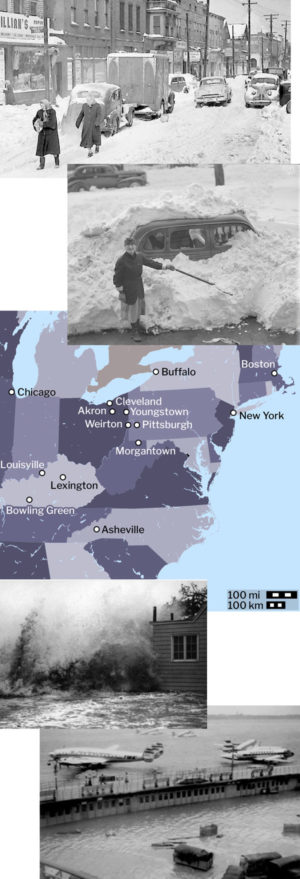 Nov 24-27: The 1950 Appalachian Blizzard brings record-breaking snow and winds to Northeast, Midwest. A strong arctic cold front passes through eastern Ohio, Kentucky, and Tennessee at midnight Friday morning, plunging temperatures ot record lows across the upper Midwest and Ohio Valley. Chicago drops to -2°F (-19°C), which equals an all-time low for November. By Saturday, Kentucky experiences new record lows for the entire month at Louisville (-1°F/-18°C), Lexington (-3°F/-19°C) and Bowling Green (-7°F/-22°C). Mount Mitchell, North Carolina, just northwest of Asheville, records a temperature of -26°F (-32). That’s about where a strong low pressure system develops along the cold front in western North Carolina on Saturday. This low becomes a winter cyclone, with hurricane-force winds battering everything in its path as it moves up the Appalachian Mountains. Wind gusts reach 94 mph (150 km/h) in New York City and 80 mph (130km/h) in Boston, and record-breaking tidal surges cause massive coastal flooding from Delaware Bay to Connecticut. The part-blizzard-part-hurricane dumps massive snow all along the western Appalachian slopes. When it approaches Pennsylvania, it makes a very unusual westward move, something that winter storms never do. Massive snowfall brings the industrial belt, which runs from Cleveland, Akron, Youngstown, Pittsburgh and Weirton, West Virginia, to a halt. Pittsburgh is buried under 30 inches. Coburn Creek, West Virginia, just south of Morgantown, sets the state’s single snowstorm record of 63.2 inches. Youngstown will receive 21 inches on Saturday alone, and another 8 inches in the two days after that. A strong high pressure system over Canada produces the oddest anomaly of the storm. On Saturday afternoon, while Pittsburgh is at 9°F (-13°C) and battling blizzard conditions, Buffalo, just 150 miles to the north, is a balmy 54°F (12°C) with heavy rains and hurricane-force wind gusts. By the time the storm finally dissipates on Monday over Lake Eire, as many as 353 people have died, almost half of them in West Virginia. Insurance claims reach $66.7 million (about $700 million today). This storm’s unusual features will make it a useful test case for future weather models.
Nov 24-27: The 1950 Appalachian Blizzard brings record-breaking snow and winds to Northeast, Midwest. A strong arctic cold front passes through eastern Ohio, Kentucky, and Tennessee at midnight Friday morning, plunging temperatures ot record lows across the upper Midwest and Ohio Valley. Chicago drops to -2°F (-19°C), which equals an all-time low for November. By Saturday, Kentucky experiences new record lows for the entire month at Louisville (-1°F/-18°C), Lexington (-3°F/-19°C) and Bowling Green (-7°F/-22°C). Mount Mitchell, North Carolina, just northwest of Asheville, records a temperature of -26°F (-32). That’s about where a strong low pressure system develops along the cold front in western North Carolina on Saturday. This low becomes a winter cyclone, with hurricane-force winds battering everything in its path as it moves up the Appalachian Mountains. Wind gusts reach 94 mph (150 km/h) in New York City and 80 mph (130km/h) in Boston, and record-breaking tidal surges cause massive coastal flooding from Delaware Bay to Connecticut. The part-blizzard-part-hurricane dumps massive snow all along the western Appalachian slopes. When it approaches Pennsylvania, it makes a very unusual westward move, something that winter storms never do. Massive snowfall brings the industrial belt, which runs from Cleveland, Akron, Youngstown, Pittsburgh and Weirton, West Virginia, to a halt. Pittsburgh is buried under 30 inches. Coburn Creek, West Virginia, just south of Morgantown, sets the state’s single snowstorm record of 63.2 inches. Youngstown will receive 21 inches on Saturday alone, and another 8 inches in the two days after that. A strong high pressure system over Canada produces the oddest anomaly of the storm. On Saturday afternoon, while Pittsburgh is at 9°F (-13°C) and battling blizzard conditions, Buffalo, just 150 miles to the north, is a balmy 54°F (12°C) with heavy rains and hurricane-force wind gusts. By the time the storm finally dissipates on Monday over Lake Eire, as many as 353 people have died, almost half of them in West Virginia. Insurance claims reach $66.7 million (about $700 million today). This storm’s unusual features will make it a useful test case for future weather models.
![]()
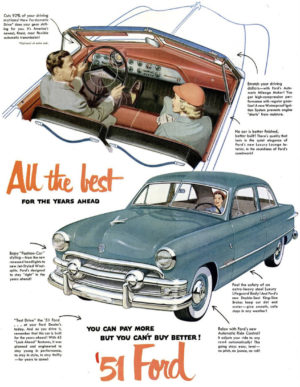 Nov 24: New Fords displayed in dealer showrooms. The big news for 1951 is Ford’s new three-speed Ford-o-matic automatic transmission, which is identical to the Merc-o-matic announced for the 1951 Mercury line a month ago. It’s a $168.50 option (about $1,800 today), the same price as that charged for the Mercury line. Body styles are relatively unchanged from the year before, but the front end sports a new dual-bullet grille and longer wrap-around chrome bumpers, which gives it a heftier appearance. New for this year is the Victoria, a two-door hard top that proves a popular competitor to the Chevrolet Bel Air. Prices begin with at $1,324 (about $13,750 today) for the Deluxe 6 Business Coup and top out at $2,058 (about $21,400 today) for the Custom 8 station wagon.
Nov 24: New Fords displayed in dealer showrooms. The big news for 1951 is Ford’s new three-speed Ford-o-matic automatic transmission, which is identical to the Merc-o-matic announced for the 1951 Mercury line a month ago. It’s a $168.50 option (about $1,800 today), the same price as that charged for the Mercury line. Body styles are relatively unchanged from the year before, but the front end sports a new dual-bullet grille and longer wrap-around chrome bumpers, which gives it a heftier appearance. New for this year is the Victoria, a two-door hard top that proves a popular competitor to the Chevrolet Bel Air. Prices begin with at $1,324 (about $13,750 today) for the Deluxe 6 Business Coup and top out at $2,058 (about $21,400 today) for the Custom 8 station wagon.
▲Saturday, November 25
![]()
 Nov 25: Snow Bowl: Massive blizzard leads to strangest college football game ever. The eastern seaboard, upper midwest and Appalachians regions are being pounded by a massive winter cyclone and blizzard. But that doesn’t stop the annual Big Game between the University of Michigan Wolverines and Ohio State Buckeyes. The game this year is at Ohio Stadium in Columbus, where the temperature at game time is 10°F (-12°C), wind gusts are up to 28 mph (45 km/h), and snow is falling at the rate of two inches (5 cm) per hour. Neither coach wants to play, but the two schools’ athletic directors overrule them. After all, the Big Ten Championship is on the line. More than 80,000 tickets were sold, but only 50,535 fans show up. Many of them probably aren’t ticket holders; gatekeepers aren’t bothering to check. Some of those fans build small fires to keep warm. The game starts two hours and twenty minutes late because the ground crew can’t get the tarp off the field. It’s frozen and buried under four feet of snow. Fans come down from the stands to help. Snow banks line the field, yard lines are invisible, as are, at times, the goal posts. The first score comes when, following a comedy of errors following a blocked punt, the Buckeyes kick a 38-yard field goal, which the kicker is barely able to see. Michigan’s first score is a safety, also the result of a blocked punt. Michigan scores its only touchdown in the second quarter. That, too, follows a blocked punt. There’s a pattern here: with a slippery ball that can’t be held, and a slippery field that makes running a dicey proposition, both teams realize that the only hope for moving the ball is to punt it and hope they can recover it further down the field. They sometimes even punt on first downs. Michigan punts 24 times and wins the game 9-3 without ever getting a first down. They fail on all nine pass attempts, and rush for only 27 yards. The Buckeyes make just three first downs, pass for 18 yards, rush for 16, and punt 21 times, four of which are blocked. Michigan clinches the Big Ten title and a Rose Bowl berth. Buckeye coach Wes Fesler will submit his resignation eighteen days later following his fourth straight loss to Michigan. He will be replaced by Woody Hayes.
Nov 25: Snow Bowl: Massive blizzard leads to strangest college football game ever. The eastern seaboard, upper midwest and Appalachians regions are being pounded by a massive winter cyclone and blizzard. But that doesn’t stop the annual Big Game between the University of Michigan Wolverines and Ohio State Buckeyes. The game this year is at Ohio Stadium in Columbus, where the temperature at game time is 10°F (-12°C), wind gusts are up to 28 mph (45 km/h), and snow is falling at the rate of two inches (5 cm) per hour. Neither coach wants to play, but the two schools’ athletic directors overrule them. After all, the Big Ten Championship is on the line. More than 80,000 tickets were sold, but only 50,535 fans show up. Many of them probably aren’t ticket holders; gatekeepers aren’t bothering to check. Some of those fans build small fires to keep warm. The game starts two hours and twenty minutes late because the ground crew can’t get the tarp off the field. It’s frozen and buried under four feet of snow. Fans come down from the stands to help. Snow banks line the field, yard lines are invisible, as are, at times, the goal posts. The first score comes when, following a comedy of errors following a blocked punt, the Buckeyes kick a 38-yard field goal, which the kicker is barely able to see. Michigan’s first score is a safety, also the result of a blocked punt. Michigan scores its only touchdown in the second quarter. That, too, follows a blocked punt. There’s a pattern here: with a slippery ball that can’t be held, and a slippery field that makes running a dicey proposition, both teams realize that the only hope for moving the ball is to punt it and hope they can recover it further down the field. They sometimes even punt on first downs. Michigan punts 24 times and wins the game 9-3 without ever getting a first down. They fail on all nine pass attempts, and rush for only 27 yards. The Buckeyes make just three first downs, pass for 18 yards, rush for 16, and punt 21 times, four of which are blocked. Michigan clinches the Big Ten title and a Rose Bowl berth. Buckeye coach Wes Fesler will submit his resignation eighteen days later following his fourth straight loss to Michigan. He will be replaced by Woody Hayes.
![]() Nov 25: Hollywood blacklist launched. Eric Johnson, President of the Motion Picture Association of America, issues a press release on behalf of major studio heads announcing the firing of the “Hollywood Ten.” The ten are screenwriters and directors who refused to answer questions before the House Un-American Activities Committee, and are now serving jail terms for contempt of Congress. The statement also assures Congress, “We will not knowingly employ a Communist or a member of any party or group which advocates the overthrow of the government of the United States.” This is regarded as the beginning of the Hollywood blacklist, although no one will publicly admit that such a list exists. An unofficial blacklist in television began in August after actress Jean Muir was fired from her role on an NBC sitcom, The Aldrich Family, just hours before it was set to air. Muir’s name appeared in the notorious pamphlet Red Channels, published in June, which accused her of being a Communist sympathizer. Red Channels is already a basis for the television blacklist, and it quickly becomes the foundational document for the Hollywood version.
Nov 25: Hollywood blacklist launched. Eric Johnson, President of the Motion Picture Association of America, issues a press release on behalf of major studio heads announcing the firing of the “Hollywood Ten.” The ten are screenwriters and directors who refused to answer questions before the House Un-American Activities Committee, and are now serving jail terms for contempt of Congress. The statement also assures Congress, “We will not knowingly employ a Communist or a member of any party or group which advocates the overthrow of the government of the United States.” This is regarded as the beginning of the Hollywood blacklist, although no one will publicly admit that such a list exists. An unofficial blacklist in television began in August after actress Jean Muir was fired from her role on an NBC sitcom, The Aldrich Family, just hours before it was set to air. Muir’s name appeared in the notorious pamphlet Red Channels, published in June, which accused her of being a Communist sympathizer. Red Channels is already a basis for the television blacklist, and it quickly becomes the foundational document for the Hollywood version.
▲Sunday, November 26
![]()
 Nov 26: Korean War, West Coast: : China launches its Second Phase Offensive. Throughout the day yesterday, U.N. troops under the command of the U.S. 8th Army in northwestern Korea advanced slowly, under somewhat increasing enemy resistance in some sectors. But shortly after dark, Chinese forces struck hard along a line from south of Usan to Ipsok and Kujang-dong. In wave after wave through the night, the Chinese are able to dislodge some American units only to withdraw again after suffering heavy casualties. The fierceness of the fighting forces American forces to cancel their plans to move northward to Unsan today and instead reorganize their positions. Further east, the Chinese have infiltrated a gap between the South’s Republic of Korea (ROK) 7th and 8th divisions and move down to block the main ROK supply roads that move northeast and northwest from Tokchin. Another Chinese column further east is doing an end-run around ROK positions to threaten Yongdong-ni from the east. By noon, the entire ROK front north has fallen back some twelve air miles (20 km). The ROK tries to establish a new defense line between Tokchon and Yongdon-ni, but broken communications, confusion in the withdrawals and continued enemy pressure frustrates the effort. Their next line of defense is the area north of Pukchang-ni. The eastern flank, which just this morning extended in a mostly straight line due east from Kujang-dong, has all but collapsed. Despite all of this, no one at Eighth Army headquarters is prepared to admit that the Chinese have opened a major offensive. Instead, they believe the Chinese will “conduct an active defense in depth along (the) present line employing local counterattack.”
Nov 26: Korean War, West Coast: : China launches its Second Phase Offensive. Throughout the day yesterday, U.N. troops under the command of the U.S. 8th Army in northwestern Korea advanced slowly, under somewhat increasing enemy resistance in some sectors. But shortly after dark, Chinese forces struck hard along a line from south of Usan to Ipsok and Kujang-dong. In wave after wave through the night, the Chinese are able to dislodge some American units only to withdraw again after suffering heavy casualties. The fierceness of the fighting forces American forces to cancel their plans to move northward to Unsan today and instead reorganize their positions. Further east, the Chinese have infiltrated a gap between the South’s Republic of Korea (ROK) 7th and 8th divisions and move down to block the main ROK supply roads that move northeast and northwest from Tokchin. Another Chinese column further east is doing an end-run around ROK positions to threaten Yongdong-ni from the east. By noon, the entire ROK front north has fallen back some twelve air miles (20 km). The ROK tries to establish a new defense line between Tokchon and Yongdon-ni, but broken communications, confusion in the withdrawals and continued enemy pressure frustrates the effort. Their next line of defense is the area north of Pukchang-ni. The eastern flank, which just this morning extended in a mostly straight line due east from Kujang-dong, has all but collapsed. Despite all of this, no one at Eighth Army headquarters is prepared to admit that the Chinese have opened a major offensive. Instead, they believe the Chinese will “conduct an active defense in depth along (the) present line employing local counterattack.”
![]() Nov 26: Korean War, West Coast: South Koreans capture Chongjin. In far northeast Korea, the ROK Capital Division captures Chongjin after having surrounded the industrial city the day before. The ROK’s plan now is to turn north and follow the highway and railroad to Hoeryong on the Manchurian border.
Nov 26: Korean War, West Coast: South Koreans capture Chongjin. In far northeast Korea, the ROK Capital Division captures Chongjin after having surrounded the industrial city the day before. The ROK’s plan now is to turn north and follow the highway and railroad to Hoeryong on the Manchurian border.
![]() Nov 26: Korean War, Chosin Reservoir: Marine advance halted. Early in the morning, the U.S. 7th Marine Regiment strikes out east from Yudan-ni in its mission to attack Mupyong-ni, fifty-five miles (90 km) to the west. The Marines quickly capture the heights commanding the mountainous road west of Yudon-ni. The going is very easy at first, until midmorning when they are stopped in their tracks about a mile (1½ km) west of Yudam-ni by a wall of Chinese troops across the entire Marine front. Despite intense air and ground support, the Marines move only a quarter mile (⅓ km) for the rest of the day. The next day, local commanders at Hagaru-ri will send reinforcements to Yudam-ni, with additional forces placed along the supply road back to Hagaru-ri.
Nov 26: Korean War, Chosin Reservoir: Marine advance halted. Early in the morning, the U.S. 7th Marine Regiment strikes out east from Yudan-ni in its mission to attack Mupyong-ni, fifty-five miles (90 km) to the west. The Marines quickly capture the heights commanding the mountainous road west of Yudon-ni. The going is very easy at first, until midmorning when they are stopped in their tracks about a mile (1½ km) west of Yudam-ni by a wall of Chinese troops across the entire Marine front. Despite intense air and ground support, the Marines move only a quarter mile (⅓ km) for the rest of the day. The next day, local commanders at Hagaru-ri will send reinforcements to Yudam-ni, with additional forces placed along the supply road back to Hagaru-ri.
▲Monday, November 27
![]()
 Nov 27: Korean War, Chosin Reservoir: Chinese Second Phase Offensive unleashed at Chosin. The first attacks comes shortly before midnight. As temperatures dip to -20°F (-29°C), assault troops of the Chinese 89th Division attack Marine positions at Yudam-ni. Marine artillery and mortar fire drive that first attack off. The second wave will come at 3:00 a.m. at Yudam-ni. The Marines barely hold their ground despite high losses. Critically, the Chinese 59th Division completes its short sweep to the south of Yudam-ni and cuts the supply road in two places, surrounding Marine positions just to the northwest of Toktong Pass. A daybreak the following morning the Chinese will back away, but leave the surrounded Marines hemmed in, too burdened with the wounded to fight their way out of encirclement. All they can do is tighten their perimeters and await rescue. At about the time Yundam-ni fights off its first wave of attacks, Col. Don Faith, Commander of the 1st Battalion, 32nd Infantry Regiment, is across the reservoir at Sinhung-ni going over plans to attack north to the Chinese border when the Chinese 80th Division launches a brutal attack lasting the entire night. The 1st Battalion holds its ground despite heavy casualties, as does the 3rd Battalion placed on the southern shore of the inlet to Singhung-ni. The following morning, aerial reconnaissance will reveal that the Chinese have set up road blocks between Hagaru-ri and Koto-ri. Additional Chinese roadblocks are established north of Hudong-ni and north of Sinhung-ni.
Nov 27: Korean War, Chosin Reservoir: Chinese Second Phase Offensive unleashed at Chosin. The first attacks comes shortly before midnight. As temperatures dip to -20°F (-29°C), assault troops of the Chinese 89th Division attack Marine positions at Yudam-ni. Marine artillery and mortar fire drive that first attack off. The second wave will come at 3:00 a.m. at Yudam-ni. The Marines barely hold their ground despite high losses. Critically, the Chinese 59th Division completes its short sweep to the south of Yudam-ni and cuts the supply road in two places, surrounding Marine positions just to the northwest of Toktong Pass. A daybreak the following morning the Chinese will back away, but leave the surrounded Marines hemmed in, too burdened with the wounded to fight their way out of encirclement. All they can do is tighten their perimeters and await rescue. At about the time Yundam-ni fights off its first wave of attacks, Col. Don Faith, Commander of the 1st Battalion, 32nd Infantry Regiment, is across the reservoir at Sinhung-ni going over plans to attack north to the Chinese border when the Chinese 80th Division launches a brutal attack lasting the entire night. The 1st Battalion holds its ground despite heavy casualties, as does the 3rd Battalion placed on the southern shore of the inlet to Singhung-ni. The following morning, aerial reconnaissance will reveal that the Chinese have set up road blocks between Hagaru-ri and Koto-ri. Additional Chinese roadblocks are established north of Hudong-ni and north of Sinhung-ni.
![]() Nov 27: Korean War, West Coast: Chinese offensive makes gains. In northwest Korea. the renewed Chinese attacks throughout the previous night continue all day today along the entire front except for the far western flank at Chongju. An especially fierce attack at Taechon forces the South Koreans to withdraw five miles (8 km). To prevent the U.S. 24th Division at Chingju from being cut off, it is pulled back to Napchongjong. The Chinese drive also poses the threat of enveloping the U.S. 25th Division east of Pakchon. East of Unsan, Chinese forces are able to wedge their way between gaps in the defenses and attack reserve forces at Ipsok, which have just been ordered to move forward to reinforce the front line but are now unable to do so. They hold their position at Ipsok, but U.S. forces further north are forced to withdraw south against the risk being surrounded. Fierce back-and-forth battles near Kujang-dong push the front a mile or so in both directions, but with U.N. forces ending the day more or less occupying the same territory as when it started. But further east, the might of two Chinese armies, attacking west from Tockchon and south at Changsang-ni forces a withdrawal south and west. By nightfall, U.S. Eighth Army headquarters at Pyongyang are coming under the realization that they are facing a large-scale planned Chinese offensive, especially now that the Chinese are fighting in open daylight.
Nov 27: Korean War, West Coast: Chinese offensive makes gains. In northwest Korea. the renewed Chinese attacks throughout the previous night continue all day today along the entire front except for the far western flank at Chongju. An especially fierce attack at Taechon forces the South Koreans to withdraw five miles (8 km). To prevent the U.S. 24th Division at Chingju from being cut off, it is pulled back to Napchongjong. The Chinese drive also poses the threat of enveloping the U.S. 25th Division east of Pakchon. East of Unsan, Chinese forces are able to wedge their way between gaps in the defenses and attack reserve forces at Ipsok, which have just been ordered to move forward to reinforce the front line but are now unable to do so. They hold their position at Ipsok, but U.S. forces further north are forced to withdraw south against the risk being surrounded. Fierce back-and-forth battles near Kujang-dong push the front a mile or so in both directions, but with U.N. forces ending the day more or less occupying the same territory as when it started. But further east, the might of two Chinese armies, attacking west from Tockchon and south at Changsang-ni forces a withdrawal south and west. By nightfall, U.S. Eighth Army headquarters at Pyongyang are coming under the realization that they are facing a large-scale planned Chinese offensive, especially now that the Chinese are fighting in open daylight.
▲Tuesday, November 28
![]()
 Nov 28: Korean War, Chosin Reservoir: Marines fend off renewed attacks. All around the Chosin (Changjin) Reservoir, last night’s attacks left the 1st Marine Division chopped up into isolated garrisons. The first order of the day is for those garrisons to regroup and establish tighter defense positions. The second is to try to rescue the surrounded and battered companies of Marines that are stranded northwest of the Toktong Pass. The two rescue attempts come from Yudam-ni and Hagaru-ri. The Hagaru-ri group only makes it about half the distance to Toktong Pass before Chinese fire from both side of the road forces it to withdraw. From Yudam-ni, the U.S .Marine rescue group is slowed by Chinese fire on both sides of the road. Darkness falls before they are able to rescue one company of trapped Marines and are forced to get back to Yudam-ni. That night, snowfall keeps things quiet at Yudam-ni. But a blistering attack at the stranded Company F at the Toktong Pass grows the casualty list to more than a hundred. Another fierce attack at an isolated regiment north of Sinhung-ni forces them into a fighting retreat southward through enemy roadblocks and across the frozen Chosin (Changjin) reservoir inlet to reunite with the 31st Infantry below Sinhung-ni. At Hagaru-ri, Chinese forces have taken up positions to the south and southeast. Snowfall delays the Chinese attack until 11:30 p.m. By then, the Marines were able to put up strong defenses around Hagaru-ri. The Chinese will break off the fight at around 4:00 a.m. the following morning.
Nov 28: Korean War, Chosin Reservoir: Marines fend off renewed attacks. All around the Chosin (Changjin) Reservoir, last night’s attacks left the 1st Marine Division chopped up into isolated garrisons. The first order of the day is for those garrisons to regroup and establish tighter defense positions. The second is to try to rescue the surrounded and battered companies of Marines that are stranded northwest of the Toktong Pass. The two rescue attempts come from Yudam-ni and Hagaru-ri. The Hagaru-ri group only makes it about half the distance to Toktong Pass before Chinese fire from both side of the road forces it to withdraw. From Yudam-ni, the U.S .Marine rescue group is slowed by Chinese fire on both sides of the road. Darkness falls before they are able to rescue one company of trapped Marines and are forced to get back to Yudam-ni. That night, snowfall keeps things quiet at Yudam-ni. But a blistering attack at the stranded Company F at the Toktong Pass grows the casualty list to more than a hundred. Another fierce attack at an isolated regiment north of Sinhung-ni forces them into a fighting retreat southward through enemy roadblocks and across the frozen Chosin (Changjin) reservoir inlet to reunite with the 31st Infantry below Sinhung-ni. At Hagaru-ri, Chinese forces have taken up positions to the south and southeast. Snowfall delays the Chinese attack until 11:30 p.m. By then, the Marines were able to put up strong defenses around Hagaru-ri. The Chinese will break off the fight at around 4:00 a.m. the following morning.
![]() Nov 28: Korean War, West Coast: U.N. forces hurled back. Chinese attacks continue from the previous night through the day today. At around midnight, Chinese forces attack from the north and northwest at Yongsan-dong, seizing the town at dawn and creating threats to U.N. flanks east and west of town. This forces U.N. forces to withdraw southwest and southeast of Yongsan-dong in a bid to protect Kuni-ri and Pakchon. Another attack on American forces at Ipsok forces them to retreat southward toward the Chongchon River. To the east, the Chinese armies repeat their pattern of previous attacks. By mid-day U.N. commanders begin issuing withdrawal orders in order to establish tighter defenses to protect the Chongchon river bridgehead. The Chinese however are now moving to exploit the collapse of ROK defenses at Kujang-dong, Tokching and Pukchan-ni. Their plan is the go around the Chongchong River bridgehead and head straight to Pyongyang by way of Sunchon. Already, they have established a robust roadblock at Samso-ri behind U.N. lines to the north.
Nov 28: Korean War, West Coast: U.N. forces hurled back. Chinese attacks continue from the previous night through the day today. At around midnight, Chinese forces attack from the north and northwest at Yongsan-dong, seizing the town at dawn and creating threats to U.N. flanks east and west of town. This forces U.N. forces to withdraw southwest and southeast of Yongsan-dong in a bid to protect Kuni-ri and Pakchon. Another attack on American forces at Ipsok forces them to retreat southward toward the Chongchon River. To the east, the Chinese armies repeat their pattern of previous attacks. By mid-day U.N. commanders begin issuing withdrawal orders in order to establish tighter defenses to protect the Chongchon river bridgehead. The Chinese however are now moving to exploit the collapse of ROK defenses at Kujang-dong, Tokching and Pukchan-ni. Their plan is the go around the Chongchong River bridgehead and head straight to Pyongyang by way of Sunchon. Already, they have established a robust roadblock at Samso-ri behind U.N. lines to the north.
![]()
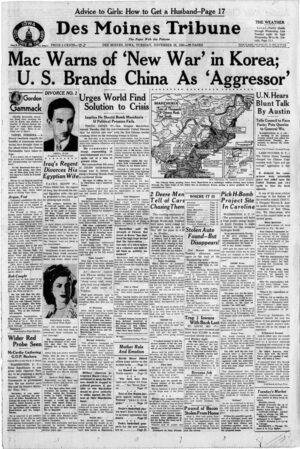 Nov 28: Korean War: MacArthur say U.N. faces an “entirely new war.” Gen. Douglas MacArthur, supreme commander of U.N. forces in Korea, issues a special communiqué recognizing that enemy actions “of the past four days disclose that a major segment of the Chinese continental armed forces in army, corps and divisional organization of an aggregate strength of over 200,000 men is now arrayed against the United Nations forces in North Korea.” He says these forces are backed by “heavy reinforcements now concentrated within the privileged sanctuary north of the international boundary. … Consequently, we face an entirely new war. This has shattered the high hopes we entertained that the intervention fo the Chinese was only of a token nature … and that therefore the war in Korea could be brought to a rapid close by our movement to the international boundary…” That “privileged sanctuary” in Chinese territory north of the Yalu River which MacArthur refers to is off limits to U.N. air and ground operations. This point of frustration compels MacArthur to add an additional paragraph to his communiqué a short time later: “This situation, repugnant as it may be, poses issues beyond the authority of the United Nations military council — issues which must find their solution within the councils of the United Nations and the chancelleries of the world.”
Nov 28: Korean War: MacArthur say U.N. faces an “entirely new war.” Gen. Douglas MacArthur, supreme commander of U.N. forces in Korea, issues a special communiqué recognizing that enemy actions “of the past four days disclose that a major segment of the Chinese continental armed forces in army, corps and divisional organization of an aggregate strength of over 200,000 men is now arrayed against the United Nations forces in North Korea.” He says these forces are backed by “heavy reinforcements now concentrated within the privileged sanctuary north of the international boundary. … Consequently, we face an entirely new war. This has shattered the high hopes we entertained that the intervention fo the Chinese was only of a token nature … and that therefore the war in Korea could be brought to a rapid close by our movement to the international boundary…” That “privileged sanctuary” in Chinese territory north of the Yalu River which MacArthur refers to is off limits to U.N. air and ground operations. This point of frustration compels MacArthur to add an additional paragraph to his communiqué a short time later: “This situation, repugnant as it may be, poses issues beyond the authority of the United Nations military council — issues which must find their solution within the councils of the United Nations and the chancelleries of the world.”
![]()
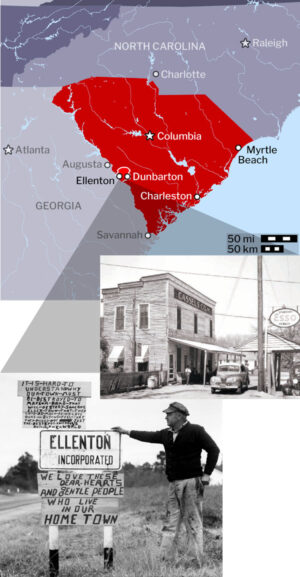 Nov 28: Atomic Energy Commission announces construction of Savannah River nuclear facility. The Atomic Energy Commission announces that it has selected a 250,000 acre (100,000 hectare) site near the Savannah River in South Carolina for a new atomic energy production facility that will manufacture materials “which can be used either for weapons or for fuels potentially useful for power purposes.” The AEC emphasizes that no atomic weaponry of any sort will be manufactured at the Savannah plant, but that it will manufacture materials which “will be utilized elsewhere.” Sources say that the Savannah River Plant, which will later be known as the Savannah River National Laboratory, is part of a larger $1 billion (about $11 billion today) appropriation request for an expanded atomic energy and weapons program. Congress has already appropriated $260 million ($2.7 billion today) to start the project. The news is greeted with elation throughout South Carolina and Georgia, except in the communities that will be erased by the mammoth project. Over the next eighteen months, some 6,000 people, mostly poor African-American farmers and sharecroppers, and a similar number of graves, will have to be removed from the area. The forced exodus will encompass the entire towns of Ellenton and Dumbarton, and several other unincorporated communities. Says waitress Mary Derry of Ellington, who moved there from Oak Ridge, Tennessee to get away from the atom bomb, “It looks like you can’t go anywhere any more.” The following Sunday, Ellington will experience its first ever traffic jam when thousands of cars filled with sightseers drive down from Augusta to get a glimpse at a town that is about to die. Sometime in December, Bonner Smith, an employee at a crate factory, will post a makeshift sign at the town’s city limits: “It is hard to understand why our town must be destroyed to make a bomb that will destroy someone else’s town that they love as much as we love ours. But we feel that they picked not just the best spot in the U.S., but in the world. We love these dear hearts and gentle people who live in our home town.”
Nov 28: Atomic Energy Commission announces construction of Savannah River nuclear facility. The Atomic Energy Commission announces that it has selected a 250,000 acre (100,000 hectare) site near the Savannah River in South Carolina for a new atomic energy production facility that will manufacture materials “which can be used either for weapons or for fuels potentially useful for power purposes.” The AEC emphasizes that no atomic weaponry of any sort will be manufactured at the Savannah plant, but that it will manufacture materials which “will be utilized elsewhere.” Sources say that the Savannah River Plant, which will later be known as the Savannah River National Laboratory, is part of a larger $1 billion (about $11 billion today) appropriation request for an expanded atomic energy and weapons program. Congress has already appropriated $260 million ($2.7 billion today) to start the project. The news is greeted with elation throughout South Carolina and Georgia, except in the communities that will be erased by the mammoth project. Over the next eighteen months, some 6,000 people, mostly poor African-American farmers and sharecroppers, and a similar number of graves, will have to be removed from the area. The forced exodus will encompass the entire towns of Ellenton and Dumbarton, and several other unincorporated communities. Says waitress Mary Derry of Ellington, who moved there from Oak Ridge, Tennessee to get away from the atom bomb, “It looks like you can’t go anywhere any more.” The following Sunday, Ellington will experience its first ever traffic jam when thousands of cars filled with sightseers drive down from Augusta to get a glimpse at a town that is about to die. Sometime in December, Bonner Smith, an employee at a crate factory, will post a makeshift sign at the town’s city limits: “It is hard to understand why our town must be destroyed to make a bomb that will destroy someone else’s town that they love as much as we love ours. But we feel that they picked not just the best spot in the U.S., but in the world. We love these dear hearts and gentle people who live in our home town.”
▲Wednesday, November 29
![]()
 Nov 29: Korean War, Chosin Reservoir: Battle at Hell Fire Valley. Morning air reconnaissance at the Chosin (Changjin) Reservoir finds that at least parts of two Chinese divisions line the ten-mile (16 km) road between Koto-ri and Hagaru-ri. At 9:30 a.m., a large armored task force sets out from Koto-ri to resupply and reinforce the stranded Marine units at the reservoir. The task force is battered by heavy fighting and by 4:15 that afternoon, it is still only three miles (4¾ km) north of Koto-ri. Given the dire situation the stranded Marines are in, the task force is ordered to proceed with the aid of air cover. Almost half way to Hagaru-ri, the task force is brought to a halt in a narrow valley by intense Chinese small arms and mortar fire that destroys a truck and blocks the road. One unit of about four hundred men breaks away from what becomes known as Hell Fire Valley and makes it to Hagaru-ri later that night. About three hundred men make it back to Koto-ri. At least 320 at Hell Fire Valley are either killed or captured. But at least Hagaru-ri now has a tank company of sixteen tanks.
Nov 29: Korean War, Chosin Reservoir: Battle at Hell Fire Valley. Morning air reconnaissance at the Chosin (Changjin) Reservoir finds that at least parts of two Chinese divisions line the ten-mile (16 km) road between Koto-ri and Hagaru-ri. At 9:30 a.m., a large armored task force sets out from Koto-ri to resupply and reinforce the stranded Marine units at the reservoir. The task force is battered by heavy fighting and by 4:15 that afternoon, it is still only three miles (4¾ km) north of Koto-ri. Given the dire situation the stranded Marines are in, the task force is ordered to proceed with the aid of air cover. Almost half way to Hagaru-ri, the task force is brought to a halt in a narrow valley by intense Chinese small arms and mortar fire that destroys a truck and blocks the road. One unit of about four hundred men breaks away from what becomes known as Hell Fire Valley and makes it to Hagaru-ri later that night. About three hundred men make it back to Koto-ri. At least 320 at Hell Fire Valley are either killed or captured. But at least Hagaru-ri now has a tank company of sixteen tanks.
![]() Nov 29: Korean War, West Coast: U.N. forces in western Korean forced to withdraw. Shortly before daylight, Chinese forces attack the ROK 6th Division just south of Pukchang-ni, driving them back almost ten miles (16 km) back to outside of Sinchang-ni, where the U.S. 7th Cavalry Regiment is being held in reserve but now finds itself on the front line. At about the same time, U.N. forces are withdrawing back to Kunu-ri when they are hit by Chinese attacks from the north and east. Holding the Chinese at Kunu-ri is all that stands in the way of the Chinese sweeping down the Chongchon River and blocking the escape southward of U.N. forces still north of the river. To tighten the defensive line in this northeast corner, U.N. forces abandon Kunu-ri and begin pulling their defenses westward toward the river. U.N. commanders issue withdrawal orders south to a line between Sukchon and Sunchon. The U.N. forces north of the Chongchon begin their orderly withdraw southward after dark with no significant pressure from the Chinese, while U.N. forces near Kunu-ri fight desperately to buy time for the river crossing.
Nov 29: Korean War, West Coast: U.N. forces in western Korean forced to withdraw. Shortly before daylight, Chinese forces attack the ROK 6th Division just south of Pukchang-ni, driving them back almost ten miles (16 km) back to outside of Sinchang-ni, where the U.S. 7th Cavalry Regiment is being held in reserve but now finds itself on the front line. At about the same time, U.N. forces are withdrawing back to Kunu-ri when they are hit by Chinese attacks from the north and east. Holding the Chinese at Kunu-ri is all that stands in the way of the Chinese sweeping down the Chongchon River and blocking the escape southward of U.N. forces still north of the river. To tighten the defensive line in this northeast corner, U.N. forces abandon Kunu-ri and begin pulling their defenses westward toward the river. U.N. commanders issue withdrawal orders south to a line between Sukchon and Sunchon. The U.N. forces north of the Chongchon begin their orderly withdraw southward after dark with no significant pressure from the Chinese, while U.N. forces near Kunu-ri fight desperately to buy time for the river crossing.
▲Thursday, November 30
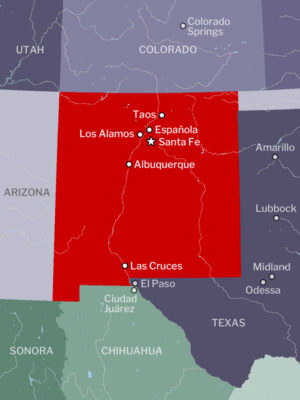 Nov 30: You can’t even get a haircut in Los Alamos. Nobody can. The lone barbershop in Los Alamos, New Mexico, closes down and will remain closed for the next two weeks. The town, home of the Manhattan Project and birthplace of the atomic bomb, is owned entirely by the Atomic Energy Commission, which contacts out all of the community’s support service to Zia Concessions. Darrell McClesky manages the barbershop and oversees five barbers. He’s out of town when AEC Security Inspector William G. Stone, who is African-American, goes into the barbershop to get a haircut. All five barbers on staff walk out rather than cut his hair. Stone will file a racial discrimination complaint against the AEC the next day. AEC rules forbid racial discrimination or segregation on AEC projects, but the rules apparently don’t apply to concessionaires. McClesky says he will personally cut Stone’s hair, but Stone refuses the invitation. “I can only allow my hair to be cut under normal conditions for I could not consider myself as capable of handling my job as a security inspector if, because of my color, I had to be treated differently.” By mid-week, McClesky will complain that despite placing classified ads in New Mexico’s ten largest cities looking for barbers who will cut hair on a “non-segregation basis,” he can’t find any takers. He will re-open in mid-December, saying he will personally man one of the chairs until he can staff back up. The very next day, the Albuquerque Journal will report that two barbers, fully qualified and licensed by the state, had tried to apply for the openings but were turned down flat with no explanation given. The barber’s names gives a likely hint for their rejection: they are Ernest Manzanares and Luís Romero, both of nearby Española.
Nov 30: You can’t even get a haircut in Los Alamos. Nobody can. The lone barbershop in Los Alamos, New Mexico, closes down and will remain closed for the next two weeks. The town, home of the Manhattan Project and birthplace of the atomic bomb, is owned entirely by the Atomic Energy Commission, which contacts out all of the community’s support service to Zia Concessions. Darrell McClesky manages the barbershop and oversees five barbers. He’s out of town when AEC Security Inspector William G. Stone, who is African-American, goes into the barbershop to get a haircut. All five barbers on staff walk out rather than cut his hair. Stone will file a racial discrimination complaint against the AEC the next day. AEC rules forbid racial discrimination or segregation on AEC projects, but the rules apparently don’t apply to concessionaires. McClesky says he will personally cut Stone’s hair, but Stone refuses the invitation. “I can only allow my hair to be cut under normal conditions for I could not consider myself as capable of handling my job as a security inspector if, because of my color, I had to be treated differently.” By mid-week, McClesky will complain that despite placing classified ads in New Mexico’s ten largest cities looking for barbers who will cut hair on a “non-segregation basis,” he can’t find any takers. He will re-open in mid-December, saying he will personally man one of the chairs until he can staff back up. The very next day, the Albuquerque Journal will report that two barbers, fully qualified and licensed by the state, had tried to apply for the openings but were turned down flat with no explanation given. The barber’s names gives a likely hint for their rejection: they are Ernest Manzanares and Luís Romero, both of nearby Española.![]()
 Nov 30: Korean War, Chosin Reservoir: Chinese renew attacks. U.N. forces in the northeast are spread out across the rugged mountainous landscape like outstretched fingers, and each finger is vulnerable to becoming surrounded and attacked from all sides like what has already happened at the Chosin (Changjin) Reservoir. U.N. Command orders a general withdrawal back to Hungnam. Forces at Chongjin, Hapsu and the Manchurian border at Hyesanjin will pull back with little pressure from the enemy. But the isolated American units around Chosin Reservoir first must figure out how to consolidate and reunite at Hagaru-ri before the body can execute a fighting withdrawal south. The Chinese aren’t making that easy. Tonight, they pound the isolated Marine positions south of Sinhung-ni commanded by Col. Don Faith. Task force Faith holds its position, but is severely weakened by the fighting. Meanwhile, Marine units at Hagaru-ri are unable to move northward to rescue Faith without endangering the defense of Hagaru-ri. Two attempts to rescue Faith from Hudong-ni have failed, even when accompanied by tanks. Those tanks have now been pulled south to Hagaru-ri to aid in its defense. Their only option is to arrange close air support for Faith and order the task force to fight its way south. It will begin doing so the next day.
Nov 30: Korean War, Chosin Reservoir: Chinese renew attacks. U.N. forces in the northeast are spread out across the rugged mountainous landscape like outstretched fingers, and each finger is vulnerable to becoming surrounded and attacked from all sides like what has already happened at the Chosin (Changjin) Reservoir. U.N. Command orders a general withdrawal back to Hungnam. Forces at Chongjin, Hapsu and the Manchurian border at Hyesanjin will pull back with little pressure from the enemy. But the isolated American units around Chosin Reservoir first must figure out how to consolidate and reunite at Hagaru-ri before the body can execute a fighting withdrawal south. The Chinese aren’t making that easy. Tonight, they pound the isolated Marine positions south of Sinhung-ni commanded by Col. Don Faith. Task force Faith holds its position, but is severely weakened by the fighting. Meanwhile, Marine units at Hagaru-ri are unable to move northward to rescue Faith without endangering the defense of Hagaru-ri. Two attempts to rescue Faith from Hudong-ni have failed, even when accompanied by tanks. Those tanks have now been pulled south to Hagaru-ri to aid in its defense. Their only option is to arrange close air support for Faith and order the task force to fight its way south. It will begin doing so the next day.
![]() Nov 30: Korean War, West Coast: U.N. begins general withdrawal north of Pyongyang.The day begins with a major Chinese attack against American and South Korean forces at Sinchang-ni. The U.N. forces are forced out of town, but are able to hold the high ground to the southwest and prevent the Chinese from slicing through to Suchon and Sukchon, or perhaps to Pyongyang itself. Up to the northwest, I Corps has completed its crossing from the north bank of the Chongchon River at Anju. Forward elements of I Corps American forces start down the diagonal secondary road from Anju to Sunchon, and discover that they have to fight their way through two Chinese roadblocks. The rest of I Corps makes the more circuitous journey through Sinanju and Sukchon, where the ROK forces in I Corps are to assemble and establish defensive positions. The Americans proceed to Sunchon, their designated assembly point, reaching it just before nightfall. Over the past two days, U.N. forces have withdrawn about thirty miles (50 km) to take up new positions approximately forty miles (65 km) north of Pyongyang.
Nov 30: Korean War, West Coast: U.N. begins general withdrawal north of Pyongyang.The day begins with a major Chinese attack against American and South Korean forces at Sinchang-ni. The U.N. forces are forced out of town, but are able to hold the high ground to the southwest and prevent the Chinese from slicing through to Suchon and Sukchon, or perhaps to Pyongyang itself. Up to the northwest, I Corps has completed its crossing from the north bank of the Chongchon River at Anju. Forward elements of I Corps American forces start down the diagonal secondary road from Anju to Sunchon, and discover that they have to fight their way through two Chinese roadblocks. The rest of I Corps makes the more circuitous journey through Sinanju and Sukchon, where the ROK forces in I Corps are to assemble and establish defensive positions. The Americans proceed to Sunchon, their designated assembly point, reaching it just before nightfall. Over the past two days, U.N. forces have withdrawn about thirty miles (50 km) to take up new positions approximately forty miles (65 km) north of Pyongyang.
![]() Nov 30: Korean War, West Coast: U.S. Second Division takes heavy losses during fighting retreat.The roadblocks on the Anju-Sunchon road herald a much tougher journey for the 2nd Division, comprised of American, South Korean and Turkish forces at Kunu-ri. Chinese forces have established positions in the high ground above a pass north of Yongwon. Early attempts to remove the roadblock fail. A British battalion is sent north from Sunchon to clear the roadblock. Soon, a second roadblock appears above the first. By noon, all of these combined forces north and south of the two roadblocks fail to dislodge the Chinese. What’s more, additional Chinese forces have fallen in behind the U.N. forces that have evacuated from Kunu-ri, removing any slim hope that they might have had of withdrawing to Anju instead. Their only option now is to run south through the two northern roadblock. Over the next two hours, the U.N. forces experienced heavy losses as they run through the gauntlet. Wrecked trucks soon make the pass impassible to vehicles, forcing troops to move on foot. Even that progress is halted by heavy Chinese machine gun fire. The addition of heavy air strikes with napalm and machine gun strafing at about 4:30 finally allows the U.N. troops to resume their movement south. Further fighting continues through the night as the U.N. forces make their slow retreat southward, taking heavy losses with each passing mile. Second Division losses are staggering, having lost about a third of its fighting strength of November 15. Equipment losses are equally heavy and the division is no longer effective. Instead of taking up defensive positions west of Sunchon, what remains of the division is sent south of Pyongyang for rehabilitation.
Nov 30: Korean War, West Coast: U.S. Second Division takes heavy losses during fighting retreat.The roadblocks on the Anju-Sunchon road herald a much tougher journey for the 2nd Division, comprised of American, South Korean and Turkish forces at Kunu-ri. Chinese forces have established positions in the high ground above a pass north of Yongwon. Early attempts to remove the roadblock fail. A British battalion is sent north from Sunchon to clear the roadblock. Soon, a second roadblock appears above the first. By noon, all of these combined forces north and south of the two roadblocks fail to dislodge the Chinese. What’s more, additional Chinese forces have fallen in behind the U.N. forces that have evacuated from Kunu-ri, removing any slim hope that they might have had of withdrawing to Anju instead. Their only option now is to run south through the two northern roadblock. Over the next two hours, the U.N. forces experienced heavy losses as they run through the gauntlet. Wrecked trucks soon make the pass impassible to vehicles, forcing troops to move on foot. Even that progress is halted by heavy Chinese machine gun fire. The addition of heavy air strikes with napalm and machine gun strafing at about 4:30 finally allows the U.N. troops to resume their movement south. Further fighting continues through the night as the U.N. forces make their slow retreat southward, taking heavy losses with each passing mile. Second Division losses are staggering, having lost about a third of its fighting strength of November 15. Equipment losses are equally heavy and the division is no longer effective. Instead of taking up defensive positions west of Sunchon, what remains of the division is sent south of Pyongyang for rehabilitation.
![]()
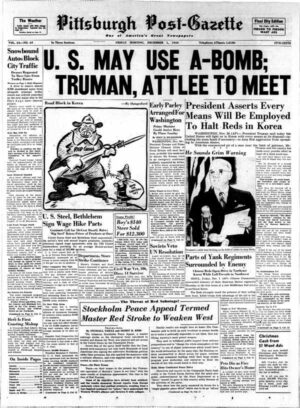 Nov 30: Truman considers use of atomic bomb in Korea. President Harry Truman begins today’s news conference with a statement on the deteriorating Korean situation. He acknowledges the recent setbacks and says U.N. forces will “meet the new situation in three ways.” They are: to work with the U.N. “for concerted action to halt this aggression,” bolster the defense capabilities of our allies, and “rapidly increase our own military strength.” During the Q&A that follows, he repeats that he will take “all necessary steps to meet the military situation.” A reporter asks, “Will that include the atomic bomb?” Truman answers, “That would include every weapon that we have.” Another reporter follows up: “Does that mean that there is active consideration of the use of the atomic bomb?” Truman responds, “Always there has been active consideration of its use.” A third reporter asks, “Did we understand you clearly” about active consideration of atomic weapons in Korea. Truman says it “always has been. It is one of our weapons.” Another reporter asks if he would seek U.N. authorization before using atomic weapons. Truman answers that he and the military commanders in the field would make such a decision. The White House follows his impromptu remarks with a clarifying statement: “It should be emphasized, that, by law, only the President can authorize the use of the atomic bomb, and no such authorization is given. … The replies to the question at today’s press conference do not present any change in this situation.” The statement comes too late to make it into the afternoon papers, but the press calms down considerably the next day. Nevertheless, foreign leaders, who are already alarmed by the dramatic U.N. losses in Korea, express grave fears over this development. British Prime Minister Clement Attlee announces to Commons that he will immediately fly to Washington for an emergency meeting with Truman.
Nov 30: Truman considers use of atomic bomb in Korea. President Harry Truman begins today’s news conference with a statement on the deteriorating Korean situation. He acknowledges the recent setbacks and says U.N. forces will “meet the new situation in three ways.” They are: to work with the U.N. “for concerted action to halt this aggression,” bolster the defense capabilities of our allies, and “rapidly increase our own military strength.” During the Q&A that follows, he repeats that he will take “all necessary steps to meet the military situation.” A reporter asks, “Will that include the atomic bomb?” Truman answers, “That would include every weapon that we have.” Another reporter follows up: “Does that mean that there is active consideration of the use of the atomic bomb?” Truman responds, “Always there has been active consideration of its use.” A third reporter asks, “Did we understand you clearly” about active consideration of atomic weapons in Korea. Truman says it “always has been. It is one of our weapons.” Another reporter asks if he would seek U.N. authorization before using atomic weapons. Truman answers that he and the military commanders in the field would make such a decision. The White House follows his impromptu remarks with a clarifying statement: “It should be emphasized, that, by law, only the President can authorize the use of the atomic bomb, and no such authorization is given. … The replies to the question at today’s press conference do not present any change in this situation.” The statement comes too late to make it into the afternoon papers, but the press calms down considerably the next day. Nevertheless, foreign leaders, who are already alarmed by the dramatic U.N. losses in Korea, express grave fears over this development. British Prime Minister Clement Attlee announces to Commons that he will immediately fly to Washington for an emergency meeting with Truman.
![[Emphasis Mine]](http://jimburroway.com/wp-content/uploads/2018/01/KissInProtestToronto.jpg)
